Unit 3 - The Developing Manager
VerifiedAdded on 2024/04/26
|20
|4119
|215
AI Summary
This assignment delves into various aspects of management in the travel and tourism industry, including leadership characteristics, communication processes, and organizational culture. It also explores personal development and career planning for future managers.
Contribute Materials
Your contribution can guide someone’s learning journey. Share your
documents today.
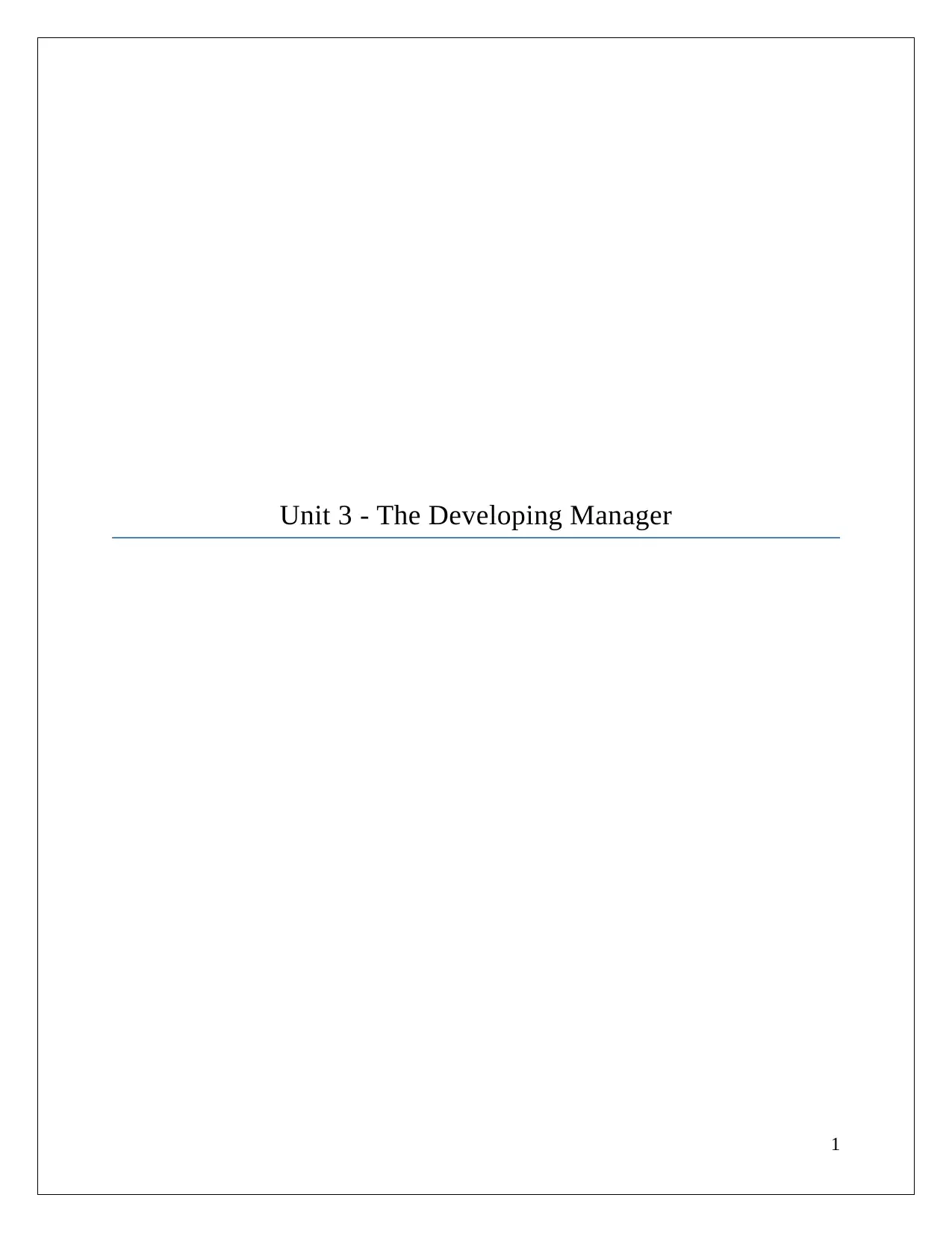
Unit 3 - The Developing Manager
1
1
Secure Best Marks with AI Grader
Need help grading? Try our AI Grader for instant feedback on your assignments.
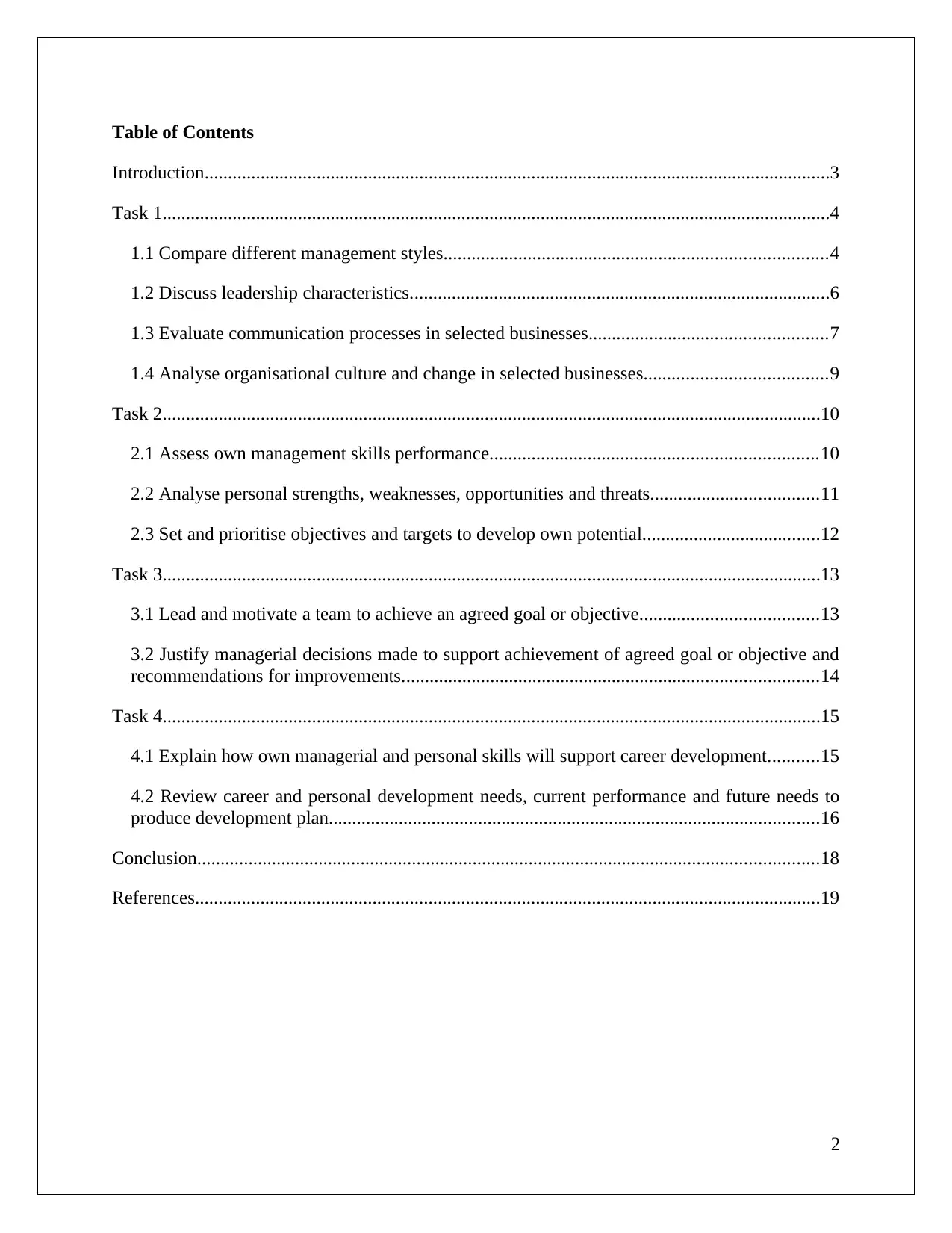
Table of Contents
Introduction......................................................................................................................................3
Task 1...............................................................................................................................................4
1.1 Compare different management styles..................................................................................4
1.2 Discuss leadership characteristics..........................................................................................6
1.3 Evaluate communication processes in selected businesses...................................................7
1.4 Analyse organisational culture and change in selected businesses.......................................9
Task 2.............................................................................................................................................10
2.1 Assess own management skills performance......................................................................10
2.2 Analyse personal strengths, weaknesses, opportunities and threats....................................11
2.3 Set and prioritise objectives and targets to develop own potential......................................12
Task 3.............................................................................................................................................13
3.1 Lead and motivate a team to achieve an agreed goal or objective......................................13
3.2 Justify managerial decisions made to support achievement of agreed goal or objective and
recommendations for improvements.........................................................................................14
Task 4.............................................................................................................................................15
4.1 Explain how own managerial and personal skills will support career development...........15
4.2 Review career and personal development needs, current performance and future needs to
produce development plan.........................................................................................................16
Conclusion.....................................................................................................................................18
References......................................................................................................................................19
2
Introduction......................................................................................................................................3
Task 1...............................................................................................................................................4
1.1 Compare different management styles..................................................................................4
1.2 Discuss leadership characteristics..........................................................................................6
1.3 Evaluate communication processes in selected businesses...................................................7
1.4 Analyse organisational culture and change in selected businesses.......................................9
Task 2.............................................................................................................................................10
2.1 Assess own management skills performance......................................................................10
2.2 Analyse personal strengths, weaknesses, opportunities and threats....................................11
2.3 Set and prioritise objectives and targets to develop own potential......................................12
Task 3.............................................................................................................................................13
3.1 Lead and motivate a team to achieve an agreed goal or objective......................................13
3.2 Justify managerial decisions made to support achievement of agreed goal or objective and
recommendations for improvements.........................................................................................14
Task 4.............................................................................................................................................15
4.1 Explain how own managerial and personal skills will support career development...........15
4.2 Review career and personal development needs, current performance and future needs to
produce development plan.........................................................................................................16
Conclusion.....................................................................................................................................18
References......................................................................................................................................19
2
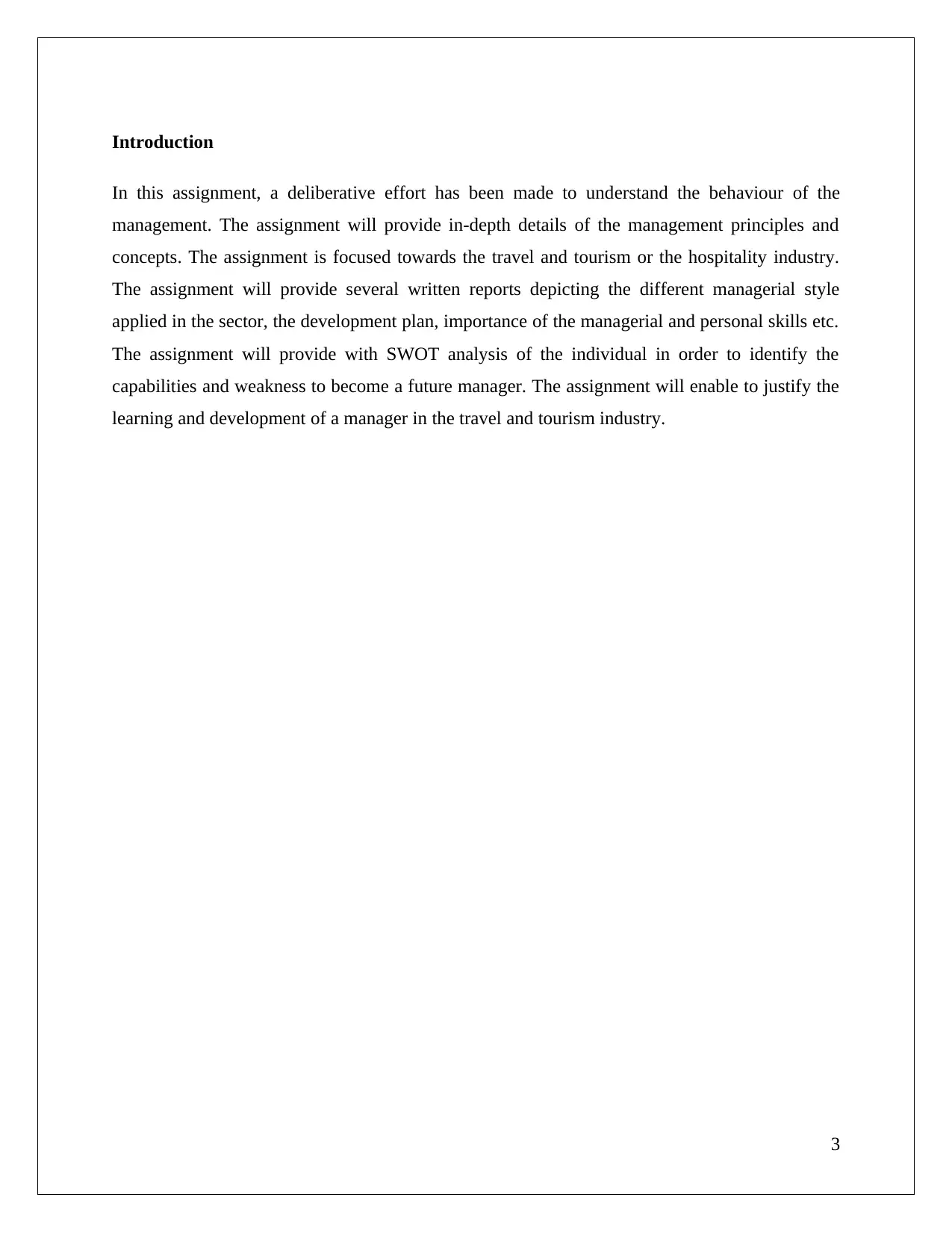
Introduction
In this assignment, a deliberative effort has been made to understand the behaviour of the
management. The assignment will provide in-depth details of the management principles and
concepts. The assignment is focused towards the travel and tourism or the hospitality industry.
The assignment will provide several written reports depicting the different managerial style
applied in the sector, the development plan, importance of the managerial and personal skills etc.
The assignment will provide with SWOT analysis of the individual in order to identify the
capabilities and weakness to become a future manager. The assignment will enable to justify the
learning and development of a manager in the travel and tourism industry.
3
In this assignment, a deliberative effort has been made to understand the behaviour of the
management. The assignment will provide in-depth details of the management principles and
concepts. The assignment is focused towards the travel and tourism or the hospitality industry.
The assignment will provide several written reports depicting the different managerial style
applied in the sector, the development plan, importance of the managerial and personal skills etc.
The assignment will provide with SWOT analysis of the individual in order to identify the
capabilities and weakness to become a future manager. The assignment will enable to justify the
learning and development of a manager in the travel and tourism industry.
3
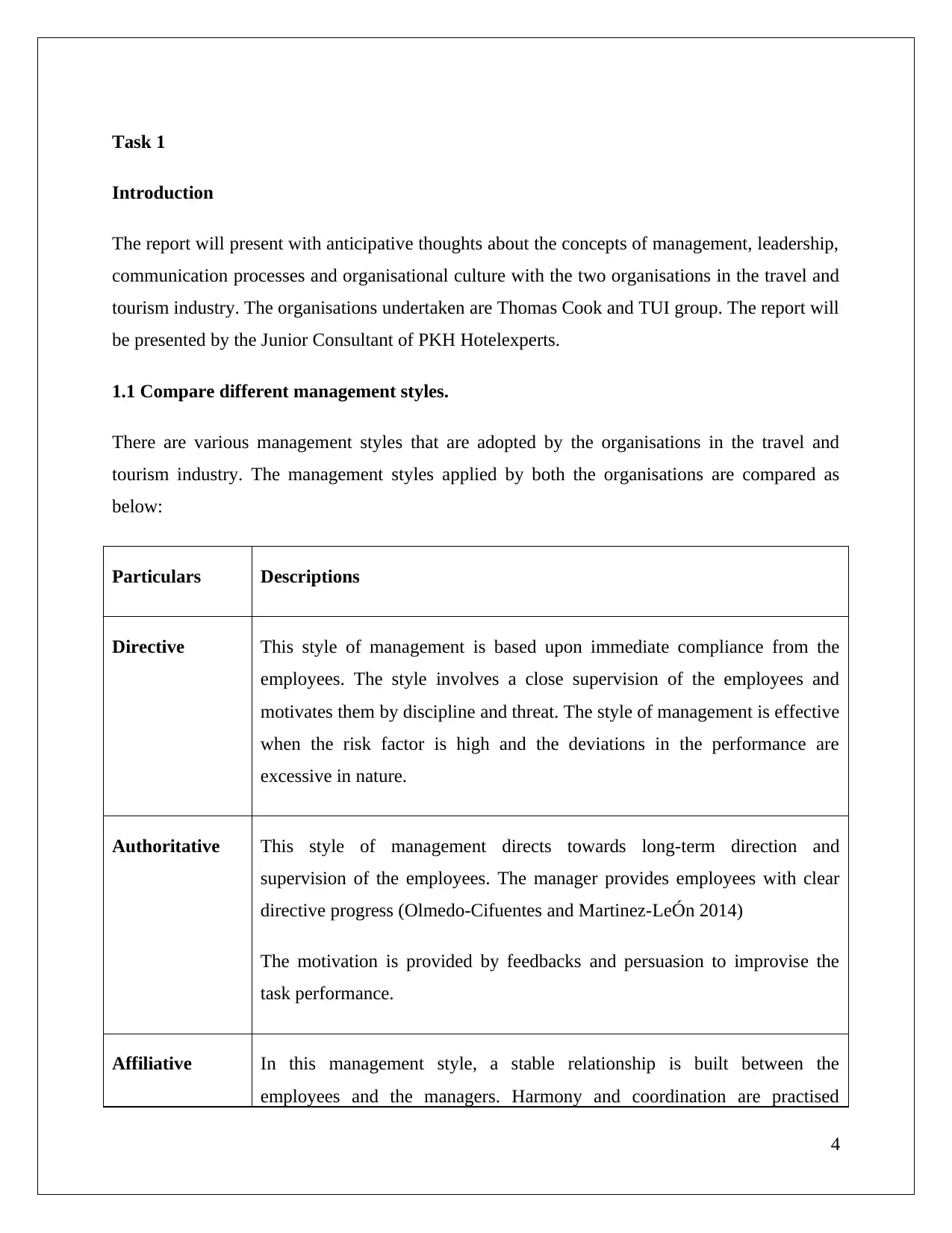
Task 1
Introduction
The report will present with anticipative thoughts about the concepts of management, leadership,
communication processes and organisational culture with the two organisations in the travel and
tourism industry. The organisations undertaken are Thomas Cook and TUI group. The report will
be presented by the Junior Consultant of PKH Hotelexperts.
1.1 Compare different management styles.
There are various management styles that are adopted by the organisations in the travel and
tourism industry. The management styles applied by both the organisations are compared as
below:
Particulars Descriptions
Directive This style of management is based upon immediate compliance from the
employees. The style involves a close supervision of the employees and
motivates them by discipline and threat. The style of management is effective
when the risk factor is high and the deviations in the performance are
excessive in nature.
Authoritative This style of management directs towards long-term direction and
supervision of the employees. The manager provides employees with clear
directive progress (Olmedo-Cifuentes and Martinez-LeÓn 2014)
The motivation is provided by feedbacks and persuasion to improvise the
task performance.
Affiliative In this management style, a stable relationship is built between the
employees and the managers. Harmony and coordination are practised
4
Introduction
The report will present with anticipative thoughts about the concepts of management, leadership,
communication processes and organisational culture with the two organisations in the travel and
tourism industry. The organisations undertaken are Thomas Cook and TUI group. The report will
be presented by the Junior Consultant of PKH Hotelexperts.
1.1 Compare different management styles.
There are various management styles that are adopted by the organisations in the travel and
tourism industry. The management styles applied by both the organisations are compared as
below:
Particulars Descriptions
Directive This style of management is based upon immediate compliance from the
employees. The style involves a close supervision of the employees and
motivates them by discipline and threat. The style of management is effective
when the risk factor is high and the deviations in the performance are
excessive in nature.
Authoritative This style of management directs towards long-term direction and
supervision of the employees. The manager provides employees with clear
directive progress (Olmedo-Cifuentes and Martinez-LeÓn 2014)
The motivation is provided by feedbacks and persuasion to improvise the
task performance.
Affiliative In this management style, a stable relationship is built between the
employees and the managers. Harmony and coordination are practised
4
Secure Best Marks with AI Grader
Need help grading? Try our AI Grader for instant feedback on your assignments.
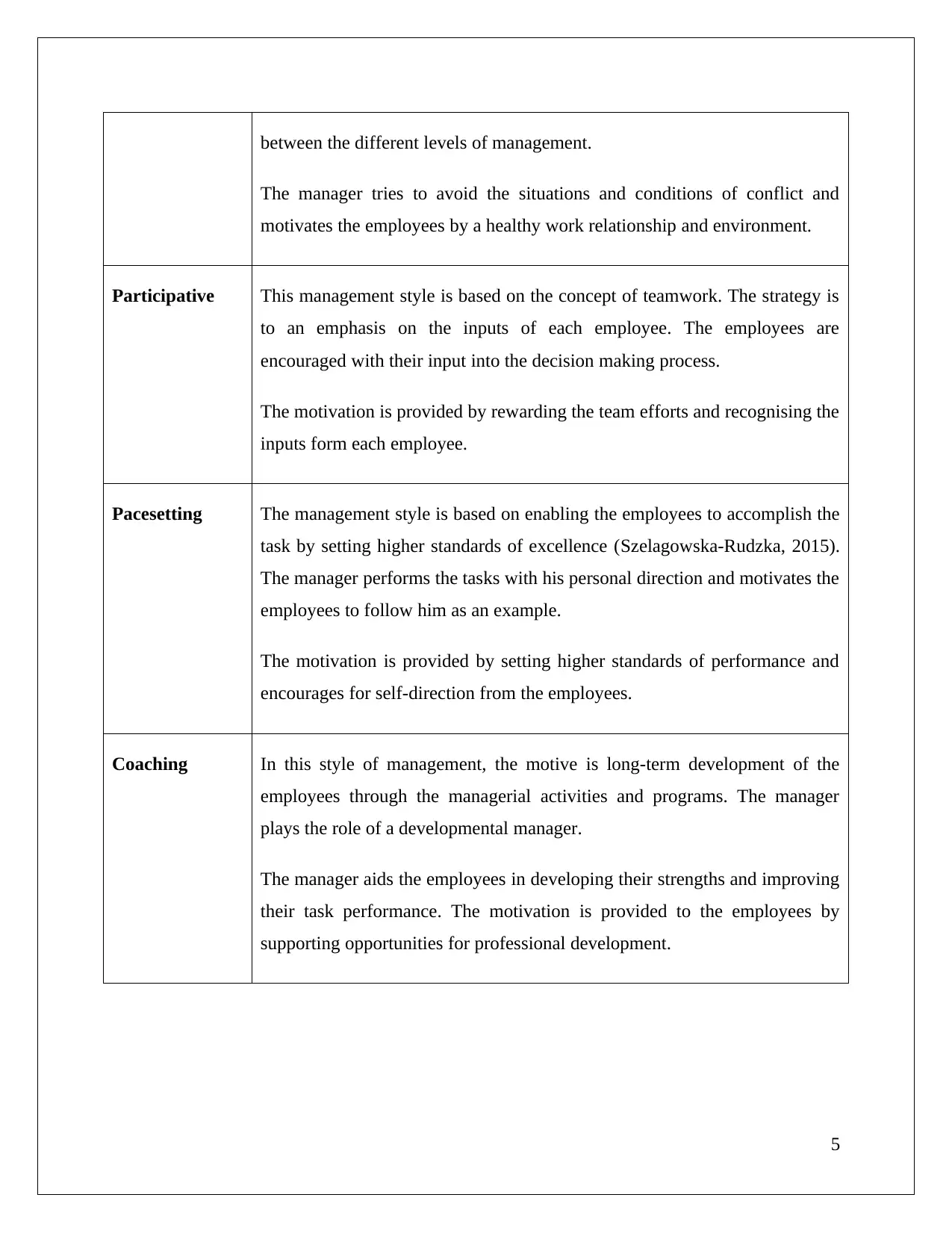
between the different levels of management.
The manager tries to avoid the situations and conditions of conflict and
motivates the employees by a healthy work relationship and environment.
Participative This management style is based on the concept of teamwork. The strategy is
to an emphasis on the inputs of each employee. The employees are
encouraged with their input into the decision making process.
The motivation is provided by rewarding the team efforts and recognising the
inputs form each employee.
Pacesetting The management style is based on enabling the employees to accomplish the
task by setting higher standards of excellence (Szelagowska-Rudzka, 2015).
The manager performs the tasks with his personal direction and motivates the
employees to follow him as an example.
The motivation is provided by setting higher standards of performance and
encourages for self-direction from the employees.
Coaching In this style of management, the motive is long-term development of the
employees through the managerial activities and programs. The manager
plays the role of a developmental manager.
The manager aids the employees in developing their strengths and improving
their task performance. The motivation is provided to the employees by
supporting opportunities for professional development.
5
The manager tries to avoid the situations and conditions of conflict and
motivates the employees by a healthy work relationship and environment.
Participative This management style is based on the concept of teamwork. The strategy is
to an emphasis on the inputs of each employee. The employees are
encouraged with their input into the decision making process.
The motivation is provided by rewarding the team efforts and recognising the
inputs form each employee.
Pacesetting The management style is based on enabling the employees to accomplish the
task by setting higher standards of excellence (Szelagowska-Rudzka, 2015).
The manager performs the tasks with his personal direction and motivates the
employees to follow him as an example.
The motivation is provided by setting higher standards of performance and
encourages for self-direction from the employees.
Coaching In this style of management, the motive is long-term development of the
employees through the managerial activities and programs. The manager
plays the role of a developmental manager.
The manager aids the employees in developing their strengths and improving
their task performance. The motivation is provided to the employees by
supporting opportunities for professional development.
5
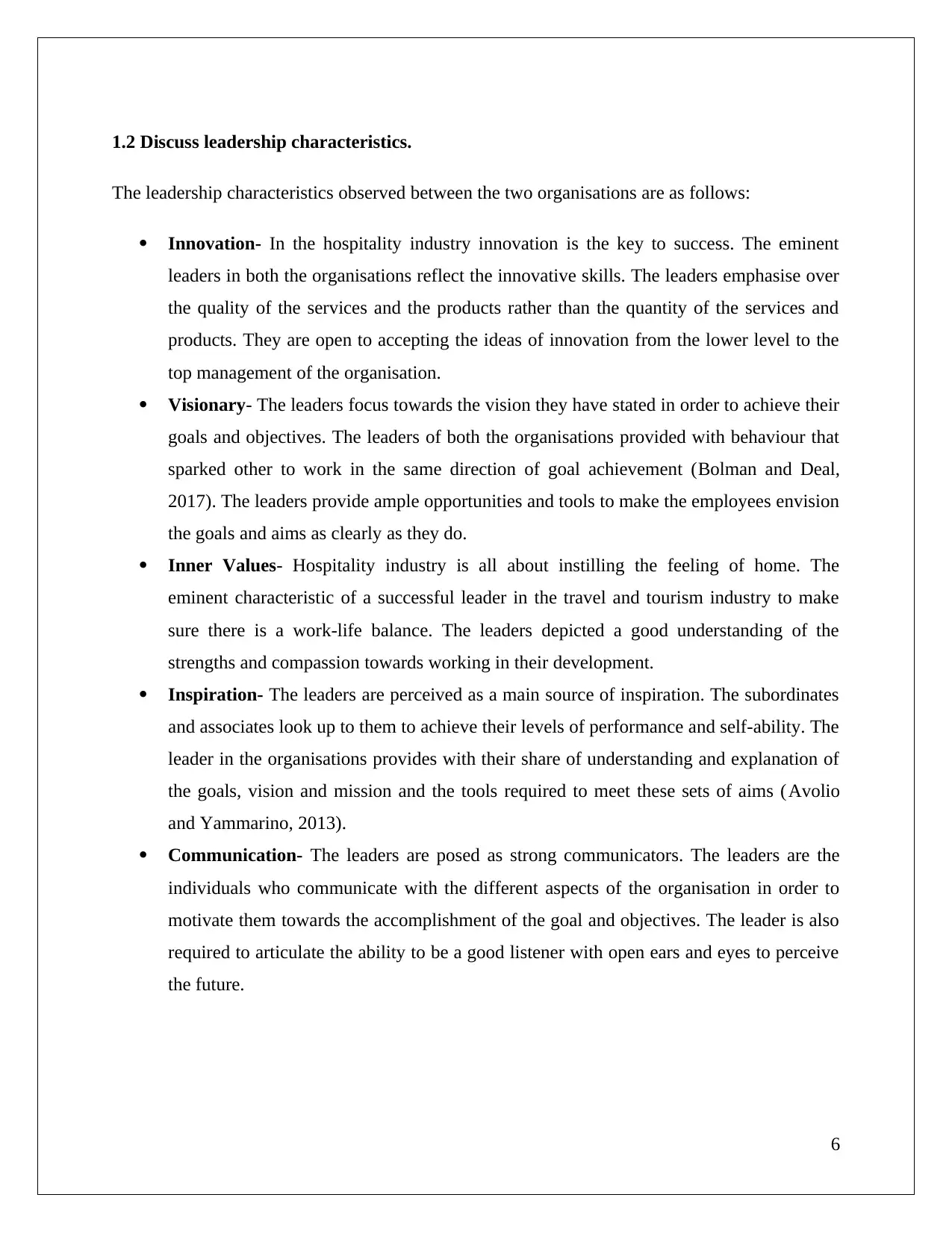
1.2 Discuss leadership characteristics.
The leadership characteristics observed between the two organisations are as follows:
Innovation- In the hospitality industry innovation is the key to success. The eminent
leaders in both the organisations reflect the innovative skills. The leaders emphasise over
the quality of the services and the products rather than the quantity of the services and
products. They are open to accepting the ideas of innovation from the lower level to the
top management of the organisation.
Visionary- The leaders focus towards the vision they have stated in order to achieve their
goals and objectives. The leaders of both the organisations provided with behaviour that
sparked other to work in the same direction of goal achievement (Bolman and Deal,
2017). The leaders provide ample opportunities and tools to make the employees envision
the goals and aims as clearly as they do.
Inner Values- Hospitality industry is all about instilling the feeling of home. The
eminent characteristic of a successful leader in the travel and tourism industry to make
sure there is a work-life balance. The leaders depicted a good understanding of the
strengths and compassion towards working in their development.
Inspiration- The leaders are perceived as a main source of inspiration. The subordinates
and associates look up to them to achieve their levels of performance and self-ability. The
leader in the organisations provides with their share of understanding and explanation of
the goals, vision and mission and the tools required to meet these sets of aims (Avolio
and Yammarino, 2013).
Communication- The leaders are posed as strong communicators. The leaders are the
individuals who communicate with the different aspects of the organisation in order to
motivate them towards the accomplishment of the goal and objectives. The leader is also
required to articulate the ability to be a good listener with open ears and eyes to perceive
the future.
6
The leadership characteristics observed between the two organisations are as follows:
Innovation- In the hospitality industry innovation is the key to success. The eminent
leaders in both the organisations reflect the innovative skills. The leaders emphasise over
the quality of the services and the products rather than the quantity of the services and
products. They are open to accepting the ideas of innovation from the lower level to the
top management of the organisation.
Visionary- The leaders focus towards the vision they have stated in order to achieve their
goals and objectives. The leaders of both the organisations provided with behaviour that
sparked other to work in the same direction of goal achievement (Bolman and Deal,
2017). The leaders provide ample opportunities and tools to make the employees envision
the goals and aims as clearly as they do.
Inner Values- Hospitality industry is all about instilling the feeling of home. The
eminent characteristic of a successful leader in the travel and tourism industry to make
sure there is a work-life balance. The leaders depicted a good understanding of the
strengths and compassion towards working in their development.
Inspiration- The leaders are perceived as a main source of inspiration. The subordinates
and associates look up to them to achieve their levels of performance and self-ability. The
leader in the organisations provides with their share of understanding and explanation of
the goals, vision and mission and the tools required to meet these sets of aims (Avolio
and Yammarino, 2013).
Communication- The leaders are posed as strong communicators. The leaders are the
individuals who communicate with the different aspects of the organisation in order to
motivate them towards the accomplishment of the goal and objectives. The leader is also
required to articulate the ability to be a good listener with open ears and eyes to perceive
the future.
6
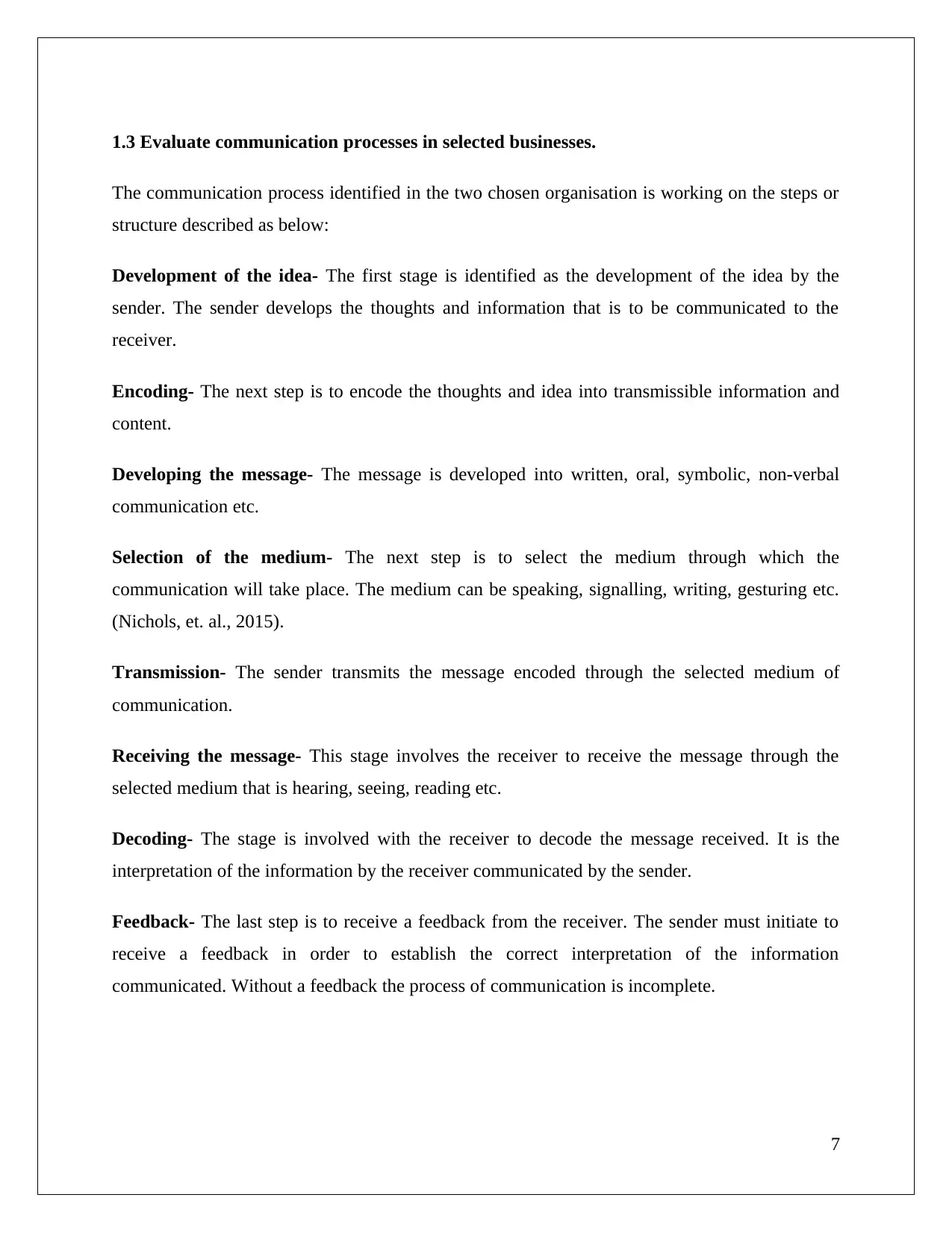
1.3 Evaluate communication processes in selected businesses.
The communication process identified in the two chosen organisation is working on the steps or
structure described as below:
Development of the idea- The first stage is identified as the development of the idea by the
sender. The sender develops the thoughts and information that is to be communicated to the
receiver.
Encoding- The next step is to encode the thoughts and idea into transmissible information and
content.
Developing the message- The message is developed into written, oral, symbolic, non-verbal
communication etc.
Selection of the medium- The next step is to select the medium through which the
communication will take place. The medium can be speaking, signalling, writing, gesturing etc.
(Nichols, et. al., 2015).
Transmission- The sender transmits the message encoded through the selected medium of
communication.
Receiving the message- This stage involves the receiver to receive the message through the
selected medium that is hearing, seeing, reading etc.
Decoding- The stage is involved with the receiver to decode the message received. It is the
interpretation of the information by the receiver communicated by the sender.
Feedback- The last step is to receive a feedback from the receiver. The sender must initiate to
receive a feedback in order to establish the correct interpretation of the information
communicated. Without a feedback the process of communication is incomplete.
7
The communication process identified in the two chosen organisation is working on the steps or
structure described as below:
Development of the idea- The first stage is identified as the development of the idea by the
sender. The sender develops the thoughts and information that is to be communicated to the
receiver.
Encoding- The next step is to encode the thoughts and idea into transmissible information and
content.
Developing the message- The message is developed into written, oral, symbolic, non-verbal
communication etc.
Selection of the medium- The next step is to select the medium through which the
communication will take place. The medium can be speaking, signalling, writing, gesturing etc.
(Nichols, et. al., 2015).
Transmission- The sender transmits the message encoded through the selected medium of
communication.
Receiving the message- This stage involves the receiver to receive the message through the
selected medium that is hearing, seeing, reading etc.
Decoding- The stage is involved with the receiver to decode the message received. It is the
interpretation of the information by the receiver communicated by the sender.
Feedback- The last step is to receive a feedback from the receiver. The sender must initiate to
receive a feedback in order to establish the correct interpretation of the information
communicated. Without a feedback the process of communication is incomplete.
7
Paraphrase This Document
Need a fresh take? Get an instant paraphrase of this document with our AI Paraphraser
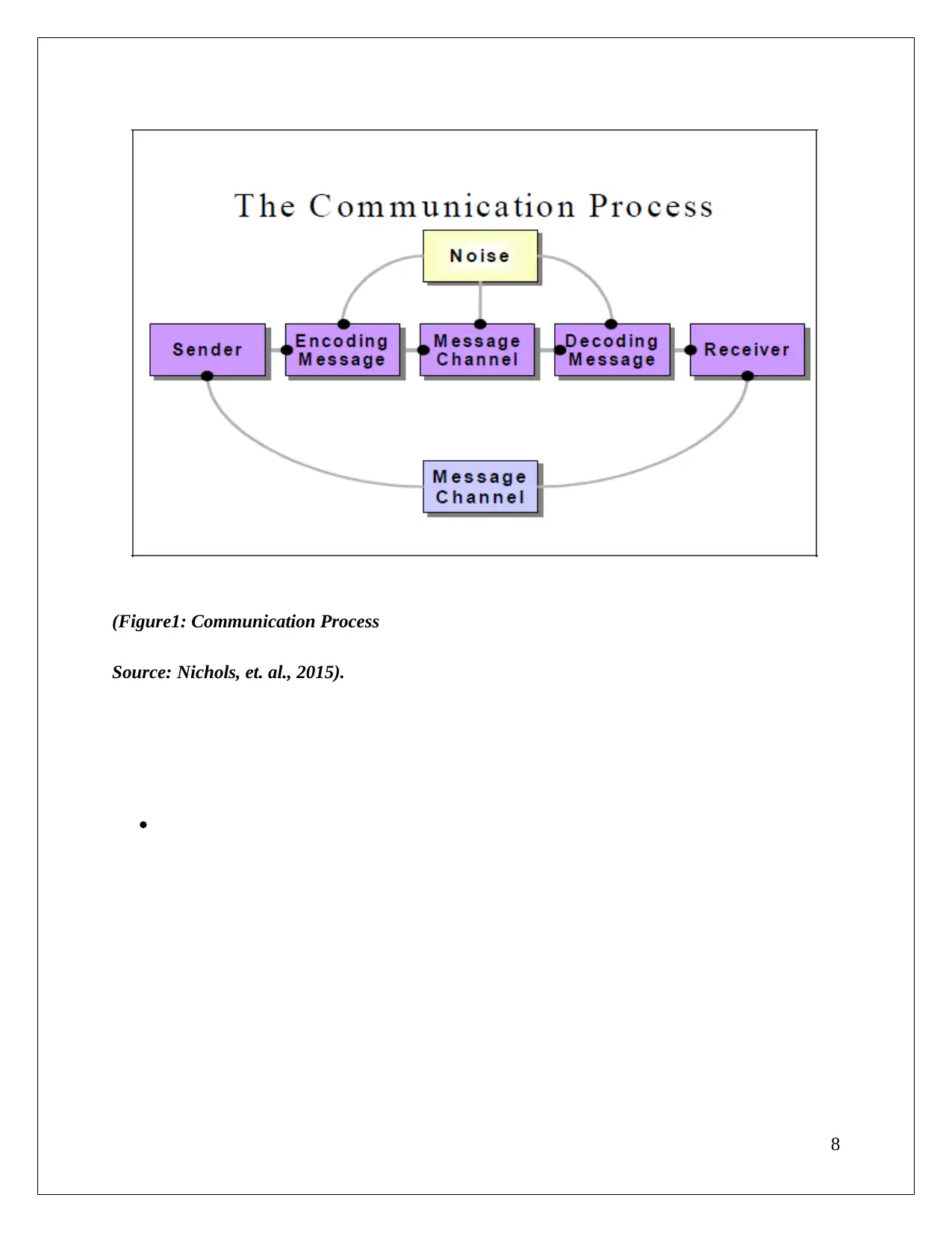
(Figure1: Communication Process
Source: Nichols, et. al., 2015).
8
Source: Nichols, et. al., 2015).
8
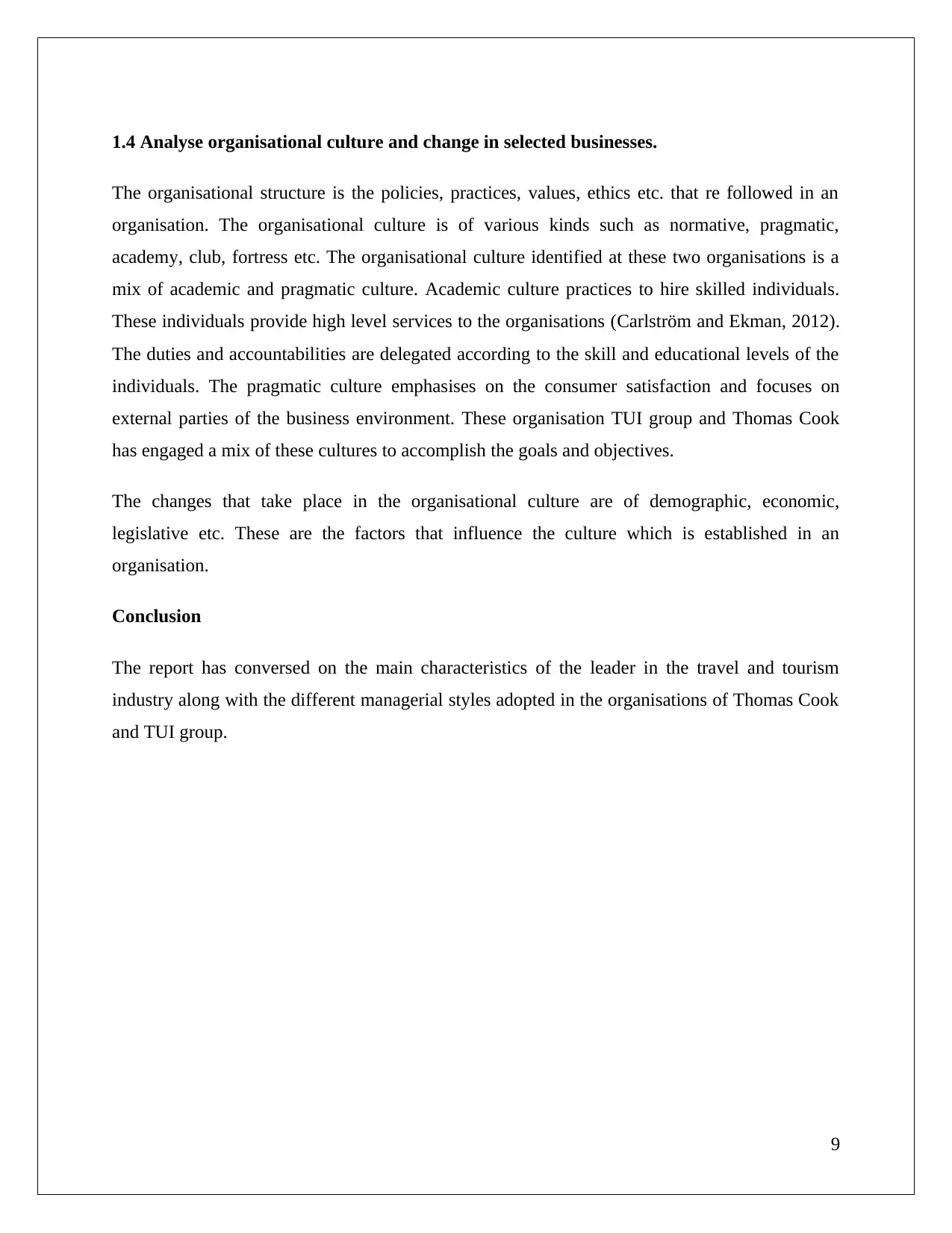
1.4 Analyse organisational culture and change in selected businesses.
The organisational structure is the policies, practices, values, ethics etc. that re followed in an
organisation. The organisational culture is of various kinds such as normative, pragmatic,
academy, club, fortress etc. The organisational culture identified at these two organisations is a
mix of academic and pragmatic culture. Academic culture practices to hire skilled individuals.
These individuals provide high level services to the organisations (Carlström and Ekman, 2012).
The duties and accountabilities are delegated according to the skill and educational levels of the
individuals. The pragmatic culture emphasises on the consumer satisfaction and focuses on
external parties of the business environment. These organisation TUI group and Thomas Cook
has engaged a mix of these cultures to accomplish the goals and objectives.
The changes that take place in the organisational culture are of demographic, economic,
legislative etc. These are the factors that influence the culture which is established in an
organisation.
Conclusion
The report has conversed on the main characteristics of the leader in the travel and tourism
industry along with the different managerial styles adopted in the organisations of Thomas Cook
and TUI group.
9
The organisational structure is the policies, practices, values, ethics etc. that re followed in an
organisation. The organisational culture is of various kinds such as normative, pragmatic,
academy, club, fortress etc. The organisational culture identified at these two organisations is a
mix of academic and pragmatic culture. Academic culture practices to hire skilled individuals.
These individuals provide high level services to the organisations (Carlström and Ekman, 2012).
The duties and accountabilities are delegated according to the skill and educational levels of the
individuals. The pragmatic culture emphasises on the consumer satisfaction and focuses on
external parties of the business environment. These organisation TUI group and Thomas Cook
has engaged a mix of these cultures to accomplish the goals and objectives.
The changes that take place in the organisational culture are of demographic, economic,
legislative etc. These are the factors that influence the culture which is established in an
organisation.
Conclusion
The report has conversed on the main characteristics of the leader in the travel and tourism
industry along with the different managerial styles adopted in the organisations of Thomas Cook
and TUI group.
9
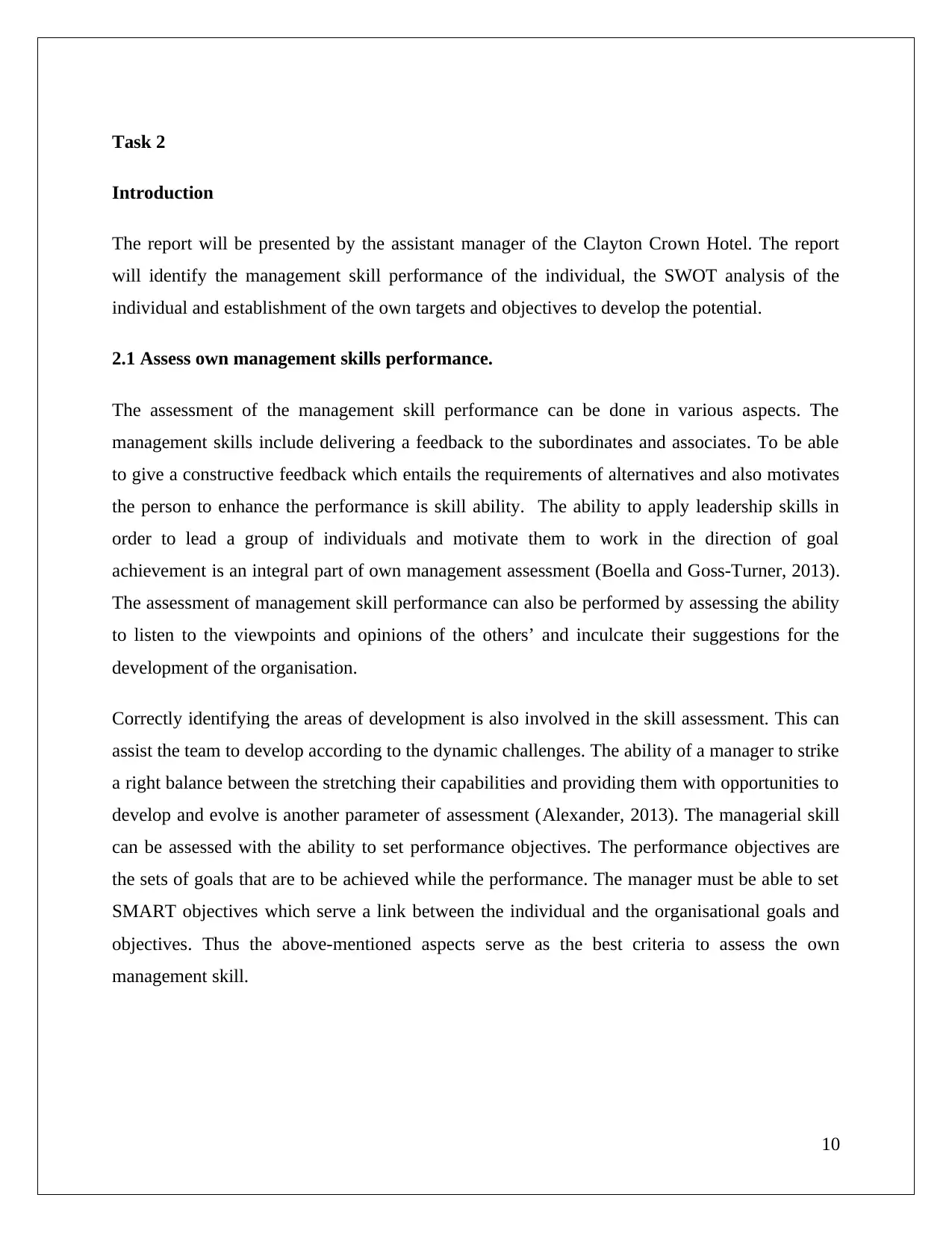
Task 2
Introduction
The report will be presented by the assistant manager of the Clayton Crown Hotel. The report
will identify the management skill performance of the individual, the SWOT analysis of the
individual and establishment of the own targets and objectives to develop the potential.
2.1 Assess own management skills performance.
The assessment of the management skill performance can be done in various aspects. The
management skills include delivering a feedback to the subordinates and associates. To be able
to give a constructive feedback which entails the requirements of alternatives and also motivates
the person to enhance the performance is skill ability. The ability to apply leadership skills in
order to lead a group of individuals and motivate them to work in the direction of goal
achievement is an integral part of own management assessment (Boella and Goss-Turner, 2013).
The assessment of management skill performance can also be performed by assessing the ability
to listen to the viewpoints and opinions of the others’ and inculcate their suggestions for the
development of the organisation.
Correctly identifying the areas of development is also involved in the skill assessment. This can
assist the team to develop according to the dynamic challenges. The ability of a manager to strike
a right balance between the stretching their capabilities and providing them with opportunities to
develop and evolve is another parameter of assessment (Alexander, 2013). The managerial skill
can be assessed with the ability to set performance objectives. The performance objectives are
the sets of goals that are to be achieved while the performance. The manager must be able to set
SMART objectives which serve a link between the individual and the organisational goals and
objectives. Thus the above-mentioned aspects serve as the best criteria to assess the own
management skill.
10
Introduction
The report will be presented by the assistant manager of the Clayton Crown Hotel. The report
will identify the management skill performance of the individual, the SWOT analysis of the
individual and establishment of the own targets and objectives to develop the potential.
2.1 Assess own management skills performance.
The assessment of the management skill performance can be done in various aspects. The
management skills include delivering a feedback to the subordinates and associates. To be able
to give a constructive feedback which entails the requirements of alternatives and also motivates
the person to enhance the performance is skill ability. The ability to apply leadership skills in
order to lead a group of individuals and motivate them to work in the direction of goal
achievement is an integral part of own management assessment (Boella and Goss-Turner, 2013).
The assessment of management skill performance can also be performed by assessing the ability
to listen to the viewpoints and opinions of the others’ and inculcate their suggestions for the
development of the organisation.
Correctly identifying the areas of development is also involved in the skill assessment. This can
assist the team to develop according to the dynamic challenges. The ability of a manager to strike
a right balance between the stretching their capabilities and providing them with opportunities to
develop and evolve is another parameter of assessment (Alexander, 2013). The managerial skill
can be assessed with the ability to set performance objectives. The performance objectives are
the sets of goals that are to be achieved while the performance. The manager must be able to set
SMART objectives which serve a link between the individual and the organisational goals and
objectives. Thus the above-mentioned aspects serve as the best criteria to assess the own
management skill.
10
Secure Best Marks with AI Grader
Need help grading? Try our AI Grader for instant feedback on your assignments.
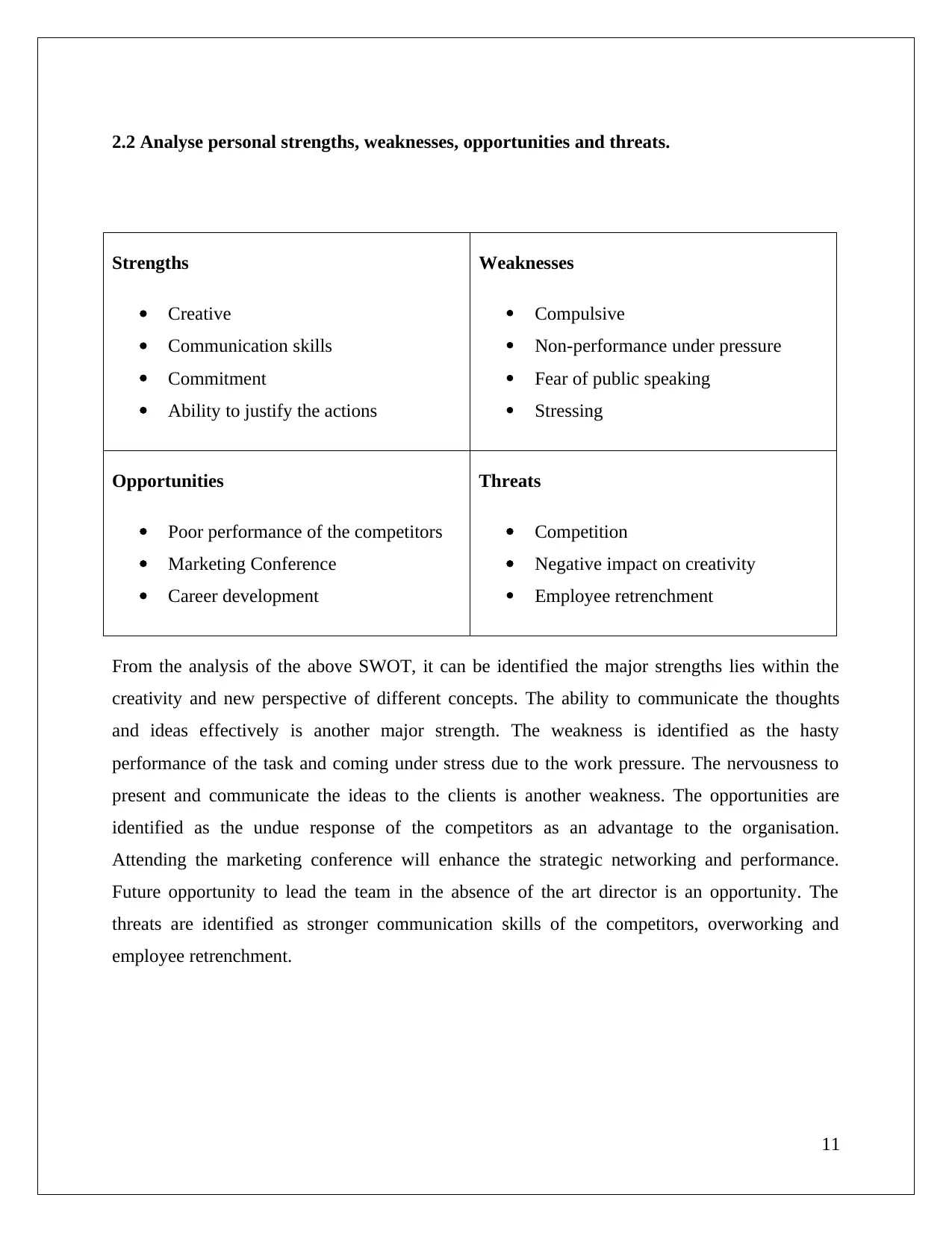
2.2 Analyse personal strengths, weaknesses, opportunities and threats.
Strengths
Creative
Communication skills
Commitment
Ability to justify the actions
Weaknesses
Compulsive
Non-performance under pressure
Fear of public speaking
Stressing
Opportunities
Poor performance of the competitors
Marketing Conference
Career development
Threats
Competition
Negative impact on creativity
Employee retrenchment
From the analysis of the above SWOT, it can be identified the major strengths lies within the
creativity and new perspective of different concepts. The ability to communicate the thoughts
and ideas effectively is another major strength. The weakness is identified as the hasty
performance of the task and coming under stress due to the work pressure. The nervousness to
present and communicate the ideas to the clients is another weakness. The opportunities are
identified as the undue response of the competitors as an advantage to the organisation.
Attending the marketing conference will enhance the strategic networking and performance.
Future opportunity to lead the team in the absence of the art director is an opportunity. The
threats are identified as stronger communication skills of the competitors, overworking and
employee retrenchment.
11
Strengths
Creative
Communication skills
Commitment
Ability to justify the actions
Weaknesses
Compulsive
Non-performance under pressure
Fear of public speaking
Stressing
Opportunities
Poor performance of the competitors
Marketing Conference
Career development
Threats
Competition
Negative impact on creativity
Employee retrenchment
From the analysis of the above SWOT, it can be identified the major strengths lies within the
creativity and new perspective of different concepts. The ability to communicate the thoughts
and ideas effectively is another major strength. The weakness is identified as the hasty
performance of the task and coming under stress due to the work pressure. The nervousness to
present and communicate the ideas to the clients is another weakness. The opportunities are
identified as the undue response of the competitors as an advantage to the organisation.
Attending the marketing conference will enhance the strategic networking and performance.
Future opportunity to lead the team in the absence of the art director is an opportunity. The
threats are identified as stronger communication skills of the competitors, overworking and
employee retrenchment.
11
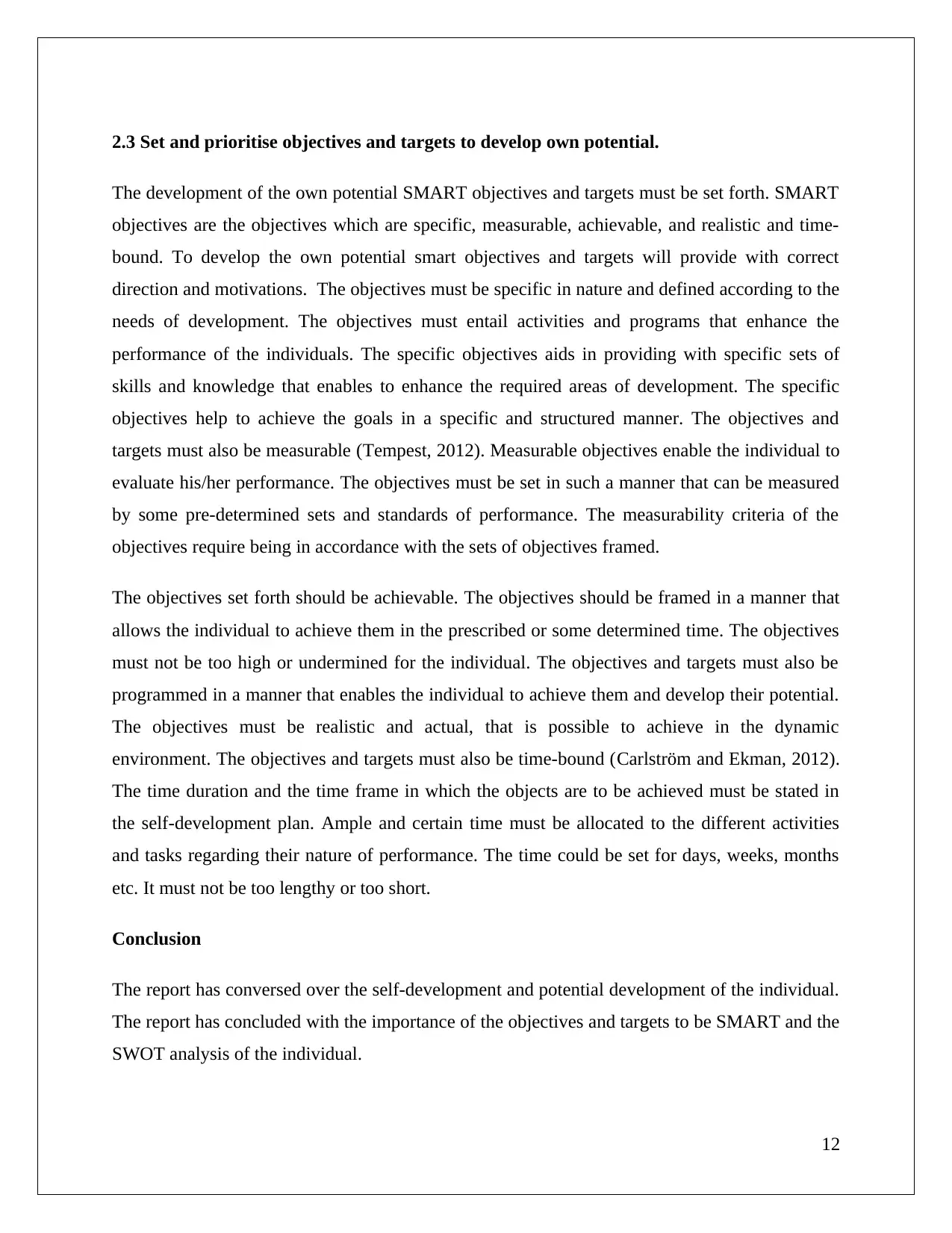
2.3 Set and prioritise objectives and targets to develop own potential.
The development of the own potential SMART objectives and targets must be set forth. SMART
objectives are the objectives which are specific, measurable, achievable, and realistic and time-
bound. To develop the own potential smart objectives and targets will provide with correct
direction and motivations. The objectives must be specific in nature and defined according to the
needs of development. The objectives must entail activities and programs that enhance the
performance of the individuals. The specific objectives aids in providing with specific sets of
skills and knowledge that enables to enhance the required areas of development. The specific
objectives help to achieve the goals in a specific and structured manner. The objectives and
targets must also be measurable (Tempest, 2012). Measurable objectives enable the individual to
evaluate his/her performance. The objectives must be set in such a manner that can be measured
by some pre-determined sets and standards of performance. The measurability criteria of the
objectives require being in accordance with the sets of objectives framed.
The objectives set forth should be achievable. The objectives should be framed in a manner that
allows the individual to achieve them in the prescribed or some determined time. The objectives
must not be too high or undermined for the individual. The objectives and targets must also be
programmed in a manner that enables the individual to achieve them and develop their potential.
The objectives must be realistic and actual, that is possible to achieve in the dynamic
environment. The objectives and targets must also be time-bound (Carlström and Ekman, 2012).
The time duration and the time frame in which the objects are to be achieved must be stated in
the self-development plan. Ample and certain time must be allocated to the different activities
and tasks regarding their nature of performance. The time could be set for days, weeks, months
etc. It must not be too lengthy or too short.
Conclusion
The report has conversed over the self-development and potential development of the individual.
The report has concluded with the importance of the objectives and targets to be SMART and the
SWOT analysis of the individual.
12
The development of the own potential SMART objectives and targets must be set forth. SMART
objectives are the objectives which are specific, measurable, achievable, and realistic and time-
bound. To develop the own potential smart objectives and targets will provide with correct
direction and motivations. The objectives must be specific in nature and defined according to the
needs of development. The objectives must entail activities and programs that enhance the
performance of the individuals. The specific objectives aids in providing with specific sets of
skills and knowledge that enables to enhance the required areas of development. The specific
objectives help to achieve the goals in a specific and structured manner. The objectives and
targets must also be measurable (Tempest, 2012). Measurable objectives enable the individual to
evaluate his/her performance. The objectives must be set in such a manner that can be measured
by some pre-determined sets and standards of performance. The measurability criteria of the
objectives require being in accordance with the sets of objectives framed.
The objectives set forth should be achievable. The objectives should be framed in a manner that
allows the individual to achieve them in the prescribed or some determined time. The objectives
must not be too high or undermined for the individual. The objectives and targets must also be
programmed in a manner that enables the individual to achieve them and develop their potential.
The objectives must be realistic and actual, that is possible to achieve in the dynamic
environment. The objectives and targets must also be time-bound (Carlström and Ekman, 2012).
The time duration and the time frame in which the objects are to be achieved must be stated in
the self-development plan. Ample and certain time must be allocated to the different activities
and tasks regarding their nature of performance. The time could be set for days, weeks, months
etc. It must not be too lengthy or too short.
Conclusion
The report has conversed over the self-development and potential development of the individual.
The report has concluded with the importance of the objectives and targets to be SMART and the
SWOT analysis of the individual.
12
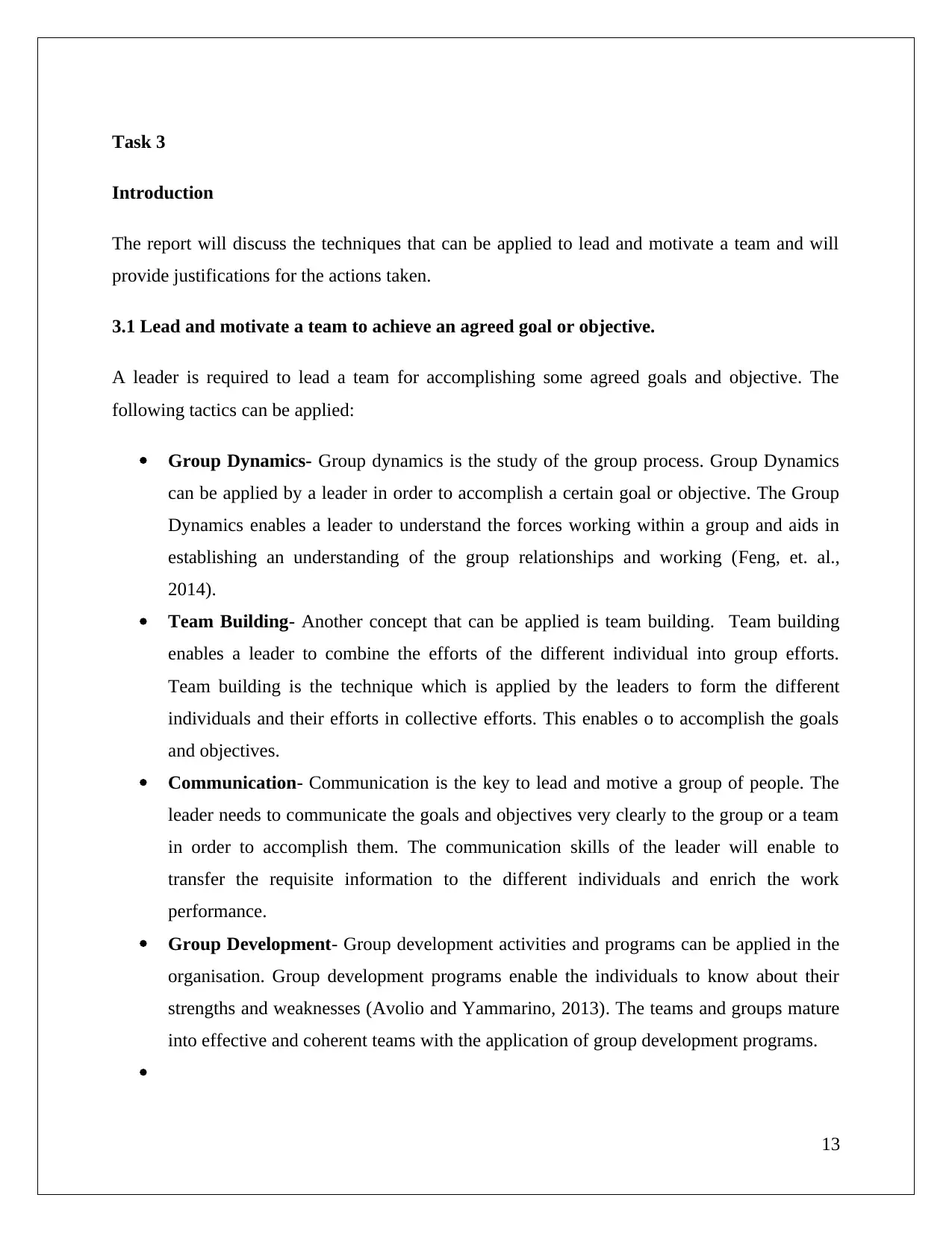
Task 3
Introduction
The report will discuss the techniques that can be applied to lead and motivate a team and will
provide justifications for the actions taken.
3.1 Lead and motivate a team to achieve an agreed goal or objective.
A leader is required to lead a team for accomplishing some agreed goals and objective. The
following tactics can be applied:
Group Dynamics- Group dynamics is the study of the group process. Group Dynamics
can be applied by a leader in order to accomplish a certain goal or objective. The Group
Dynamics enables a leader to understand the forces working within a group and aids in
establishing an understanding of the group relationships and working (Feng, et. al.,
2014).
Team Building- Another concept that can be applied is team building. Team building
enables a leader to combine the efforts of the different individual into group efforts.
Team building is the technique which is applied by the leaders to form the different
individuals and their efforts in collective efforts. This enables o to accomplish the goals
and objectives.
Communication- Communication is the key to lead and motive a group of people. The
leader needs to communicate the goals and objectives very clearly to the group or a team
in order to accomplish them. The communication skills of the leader will enable to
transfer the requisite information to the different individuals and enrich the work
performance.
Group Development- Group development activities and programs can be applied in the
organisation. Group development programs enable the individuals to know about their
strengths and weaknesses (Avolio and Yammarino, 2013). The teams and groups mature
into effective and coherent teams with the application of group development programs.
13
Introduction
The report will discuss the techniques that can be applied to lead and motivate a team and will
provide justifications for the actions taken.
3.1 Lead and motivate a team to achieve an agreed goal or objective.
A leader is required to lead a team for accomplishing some agreed goals and objective. The
following tactics can be applied:
Group Dynamics- Group dynamics is the study of the group process. Group Dynamics
can be applied by a leader in order to accomplish a certain goal or objective. The Group
Dynamics enables a leader to understand the forces working within a group and aids in
establishing an understanding of the group relationships and working (Feng, et. al.,
2014).
Team Building- Another concept that can be applied is team building. Team building
enables a leader to combine the efforts of the different individual into group efforts.
Team building is the technique which is applied by the leaders to form the different
individuals and their efforts in collective efforts. This enables o to accomplish the goals
and objectives.
Communication- Communication is the key to lead and motive a group of people. The
leader needs to communicate the goals and objectives very clearly to the group or a team
in order to accomplish them. The communication skills of the leader will enable to
transfer the requisite information to the different individuals and enrich the work
performance.
Group Development- Group development activities and programs can be applied in the
organisation. Group development programs enable the individuals to know about their
strengths and weaknesses (Avolio and Yammarino, 2013). The teams and groups mature
into effective and coherent teams with the application of group development programs.
13
Paraphrase This Document
Need a fresh take? Get an instant paraphrase of this document with our AI Paraphraser
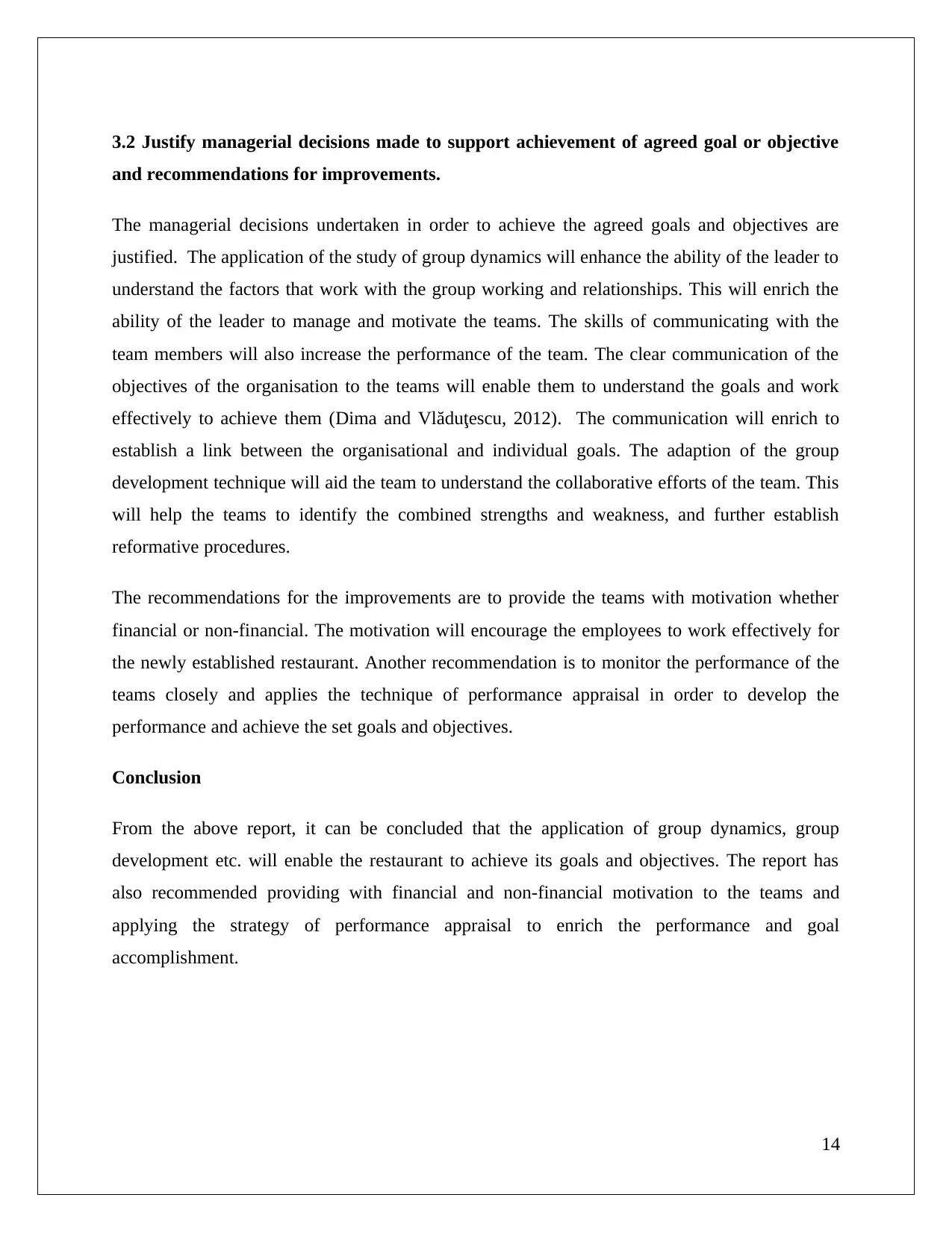
3.2 Justify managerial decisions made to support achievement of agreed goal or objective
and recommendations for improvements.
The managerial decisions undertaken in order to achieve the agreed goals and objectives are
justified. The application of the study of group dynamics will enhance the ability of the leader to
understand the factors that work with the group working and relationships. This will enrich the
ability of the leader to manage and motivate the teams. The skills of communicating with the
team members will also increase the performance of the team. The clear communication of the
objectives of the organisation to the teams will enable them to understand the goals and work
effectively to achieve them (Dima and Vlăduţescu, 2012). The communication will enrich to
establish a link between the organisational and individual goals. The adaption of the group
development technique will aid the team to understand the collaborative efforts of the team. This
will help the teams to identify the combined strengths and weakness, and further establish
reformative procedures.
The recommendations for the improvements are to provide the teams with motivation whether
financial or non-financial. The motivation will encourage the employees to work effectively for
the newly established restaurant. Another recommendation is to monitor the performance of the
teams closely and applies the technique of performance appraisal in order to develop the
performance and achieve the set goals and objectives.
Conclusion
From the above report, it can be concluded that the application of group dynamics, group
development etc. will enable the restaurant to achieve its goals and objectives. The report has
also recommended providing with financial and non-financial motivation to the teams and
applying the strategy of performance appraisal to enrich the performance and goal
accomplishment.
14
and recommendations for improvements.
The managerial decisions undertaken in order to achieve the agreed goals and objectives are
justified. The application of the study of group dynamics will enhance the ability of the leader to
understand the factors that work with the group working and relationships. This will enrich the
ability of the leader to manage and motivate the teams. The skills of communicating with the
team members will also increase the performance of the team. The clear communication of the
objectives of the organisation to the teams will enable them to understand the goals and work
effectively to achieve them (Dima and Vlăduţescu, 2012). The communication will enrich to
establish a link between the organisational and individual goals. The adaption of the group
development technique will aid the team to understand the collaborative efforts of the team. This
will help the teams to identify the combined strengths and weakness, and further establish
reformative procedures.
The recommendations for the improvements are to provide the teams with motivation whether
financial or non-financial. The motivation will encourage the employees to work effectively for
the newly established restaurant. Another recommendation is to monitor the performance of the
teams closely and applies the technique of performance appraisal in order to develop the
performance and achieve the set goals and objectives.
Conclusion
From the above report, it can be concluded that the application of group dynamics, group
development etc. will enable the restaurant to achieve its goals and objectives. The report has
also recommended providing with financial and non-financial motivation to the teams and
applying the strategy of performance appraisal to enrich the performance and goal
accomplishment.
14
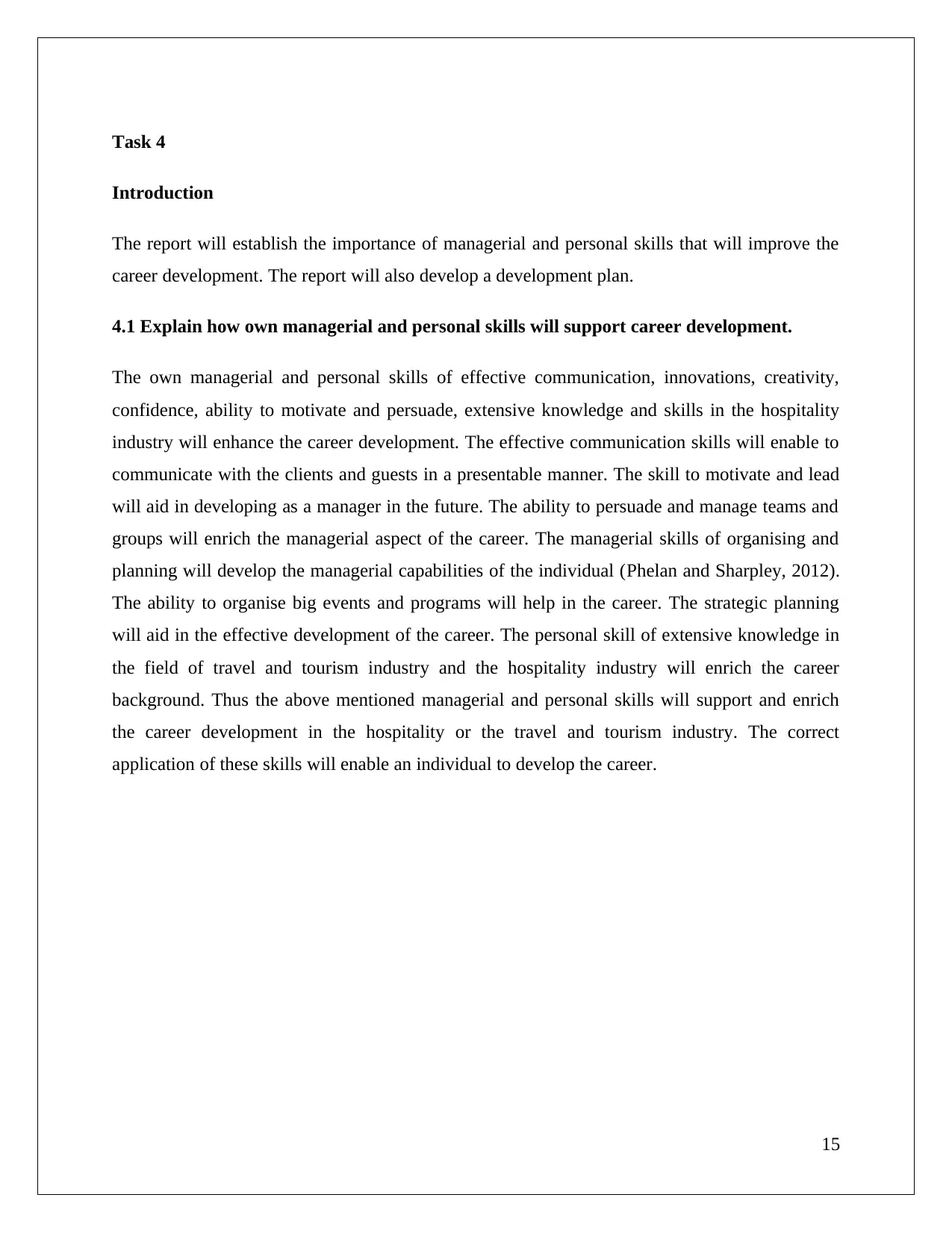
Task 4
Introduction
The report will establish the importance of managerial and personal skills that will improve the
career development. The report will also develop a development plan.
4.1 Explain how own managerial and personal skills will support career development.
The own managerial and personal skills of effective communication, innovations, creativity,
confidence, ability to motivate and persuade, extensive knowledge and skills in the hospitality
industry will enhance the career development. The effective communication skills will enable to
communicate with the clients and guests in a presentable manner. The skill to motivate and lead
will aid in developing as a manager in the future. The ability to persuade and manage teams and
groups will enrich the managerial aspect of the career. The managerial skills of organising and
planning will develop the managerial capabilities of the individual (Phelan and Sharpley, 2012).
The ability to organise big events and programs will help in the career. The strategic planning
will aid in the effective development of the career. The personal skill of extensive knowledge in
the field of travel and tourism industry and the hospitality industry will enrich the career
background. Thus the above mentioned managerial and personal skills will support and enrich
the career development in the hospitality or the travel and tourism industry. The correct
application of these skills will enable an individual to develop the career.
15
Introduction
The report will establish the importance of managerial and personal skills that will improve the
career development. The report will also develop a development plan.
4.1 Explain how own managerial and personal skills will support career development.
The own managerial and personal skills of effective communication, innovations, creativity,
confidence, ability to motivate and persuade, extensive knowledge and skills in the hospitality
industry will enhance the career development. The effective communication skills will enable to
communicate with the clients and guests in a presentable manner. The skill to motivate and lead
will aid in developing as a manager in the future. The ability to persuade and manage teams and
groups will enrich the managerial aspect of the career. The managerial skills of organising and
planning will develop the managerial capabilities of the individual (Phelan and Sharpley, 2012).
The ability to organise big events and programs will help in the career. The strategic planning
will aid in the effective development of the career. The personal skill of extensive knowledge in
the field of travel and tourism industry and the hospitality industry will enrich the career
background. Thus the above mentioned managerial and personal skills will support and enrich
the career development in the hospitality or the travel and tourism industry. The correct
application of these skills will enable an individual to develop the career.
15
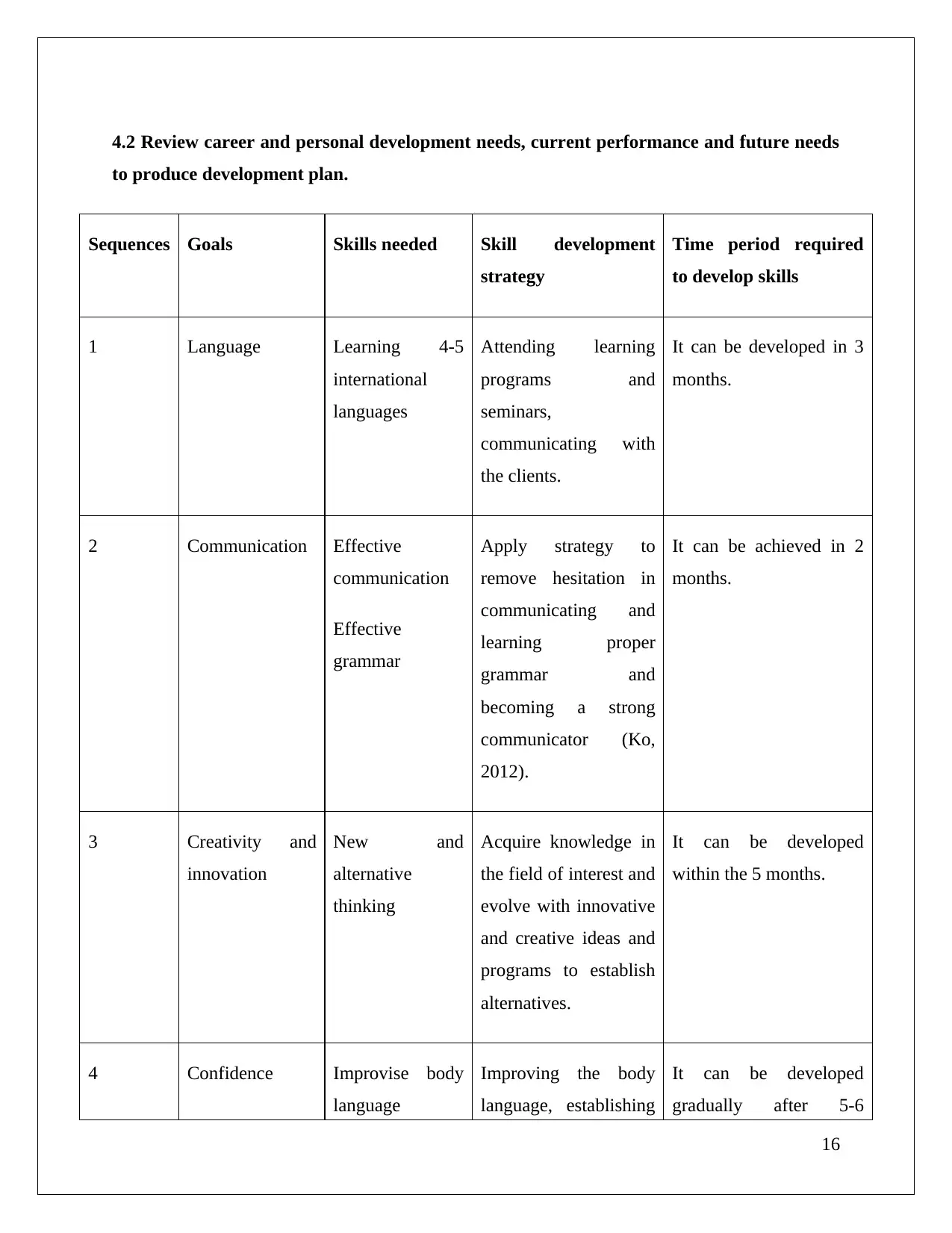
4.2 Review career and personal development needs, current performance and future needs
to produce development plan.
Sequences Goals Skills needed Skill development
strategy
Time period required
to develop skills
1 Language Learning 4-5
international
languages
Attending learning
programs and
seminars,
communicating with
the clients.
It can be developed in 3
months.
2 Communication Effective
communication
Effective
grammar
Apply strategy to
remove hesitation in
communicating and
learning proper
grammar and
becoming a strong
communicator (Ko,
2012).
It can be achieved in 2
months.
3 Creativity and
innovation
New and
alternative
thinking
Acquire knowledge in
the field of interest and
evolve with innovative
and creative ideas and
programs to establish
alternatives.
It can be developed
within the 5 months.
4 Confidence Improvise body
language
Improving the body
language, establishing
It can be developed
gradually after 5-6
16
to produce development plan.
Sequences Goals Skills needed Skill development
strategy
Time period required
to develop skills
1 Language Learning 4-5
international
languages
Attending learning
programs and
seminars,
communicating with
the clients.
It can be developed in 3
months.
2 Communication Effective
communication
Effective
grammar
Apply strategy to
remove hesitation in
communicating and
learning proper
grammar and
becoming a strong
communicator (Ko,
2012).
It can be achieved in 2
months.
3 Creativity and
innovation
New and
alternative
thinking
Acquire knowledge in
the field of interest and
evolve with innovative
and creative ideas and
programs to establish
alternatives.
It can be developed
within the 5 months.
4 Confidence Improvise body
language
Improving the body
language, establishing
It can be developed
gradually after 5-6
16
Secure Best Marks with AI Grader
Need help grading? Try our AI Grader for instant feedback on your assignments.
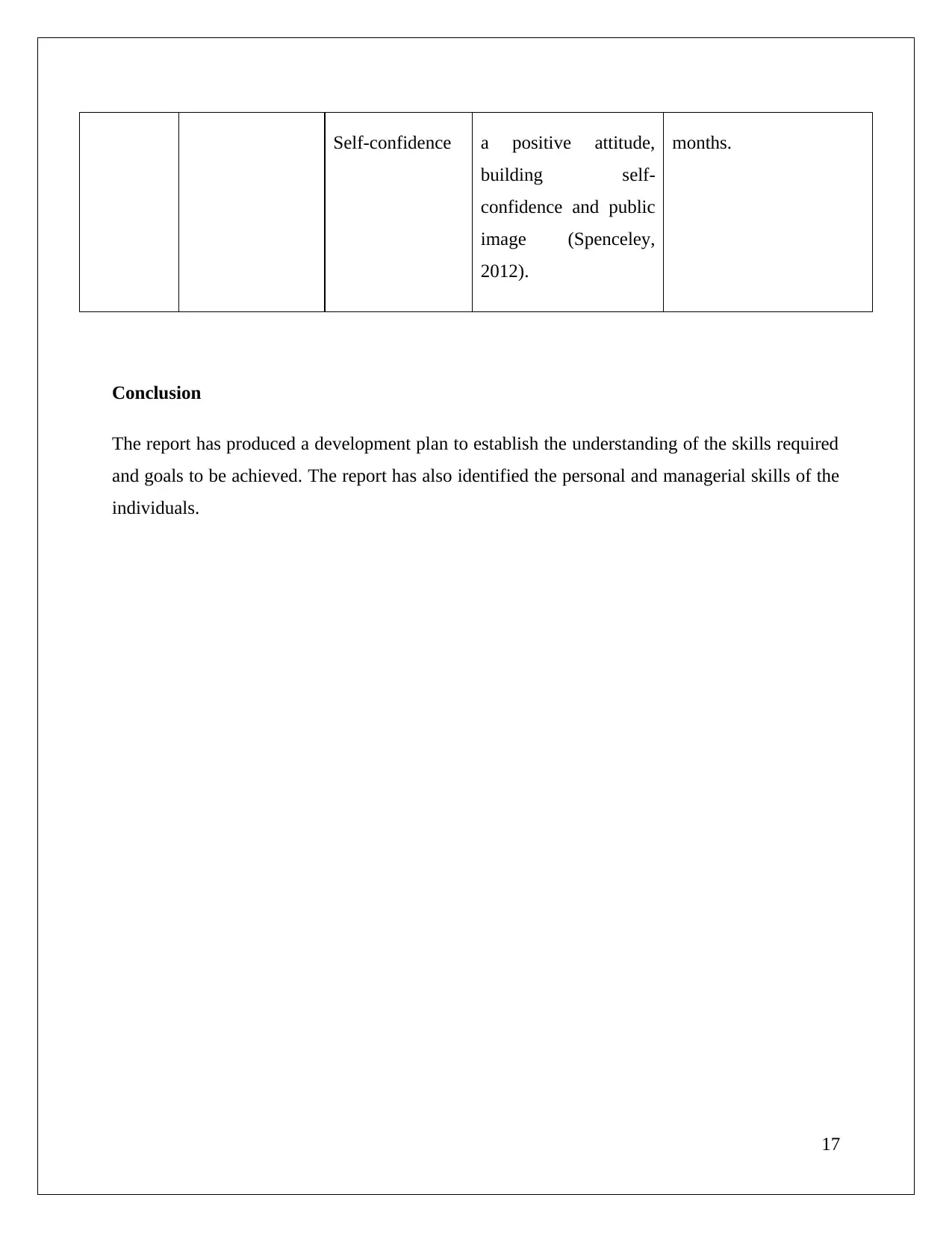
Self-confidence a positive attitude,
building self-
confidence and public
image (Spenceley,
2012).
months.
Conclusion
The report has produced a development plan to establish the understanding of the skills required
and goals to be achieved. The report has also identified the personal and managerial skills of the
individuals.
17
building self-
confidence and public
image (Spenceley,
2012).
months.
Conclusion
The report has produced a development plan to establish the understanding of the skills required
and goals to be achieved. The report has also identified the personal and managerial skills of the
individuals.
17
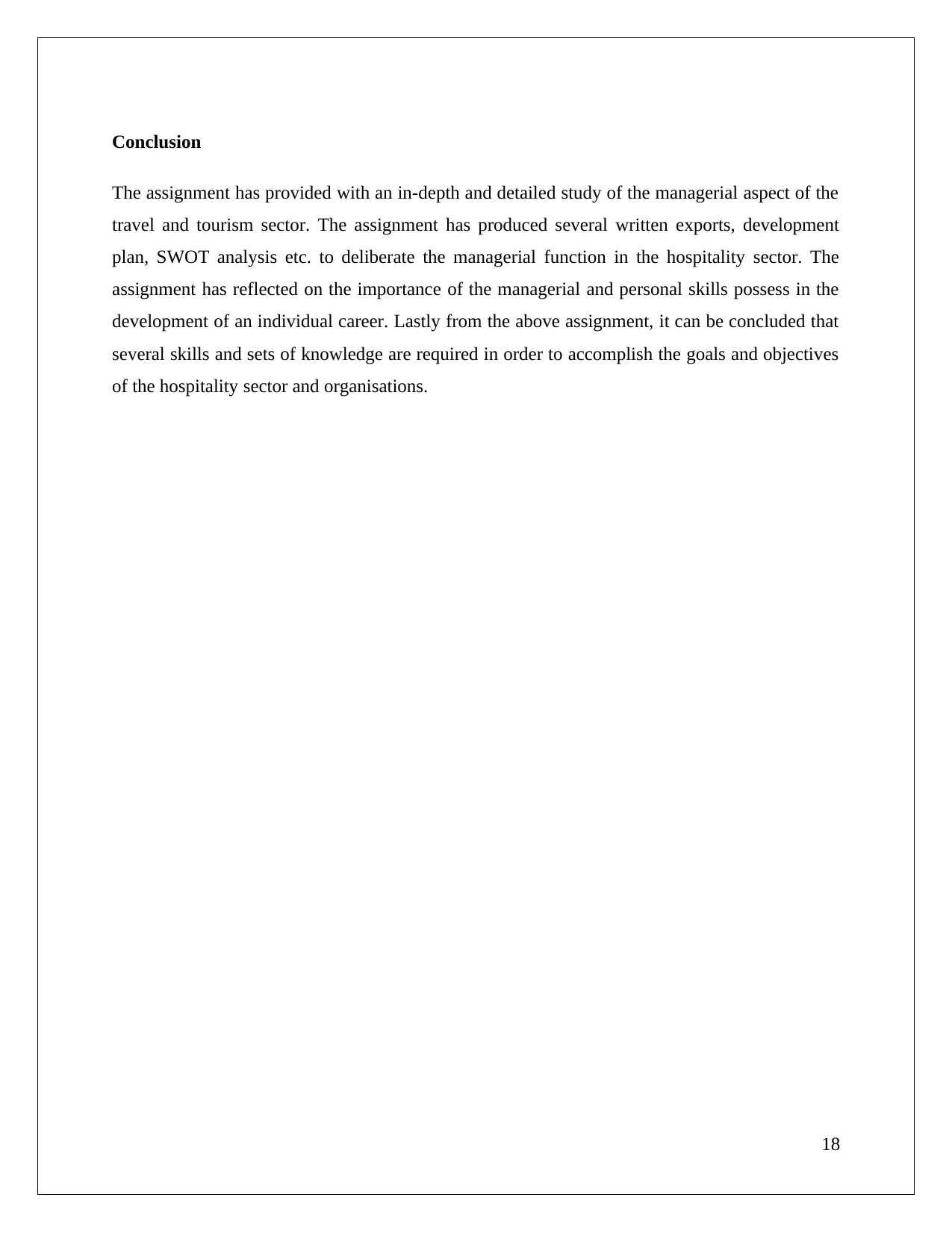
Conclusion
The assignment has provided with an in-depth and detailed study of the managerial aspect of the
travel and tourism sector. The assignment has produced several written exports, development
plan, SWOT analysis etc. to deliberate the managerial function in the hospitality sector. The
assignment has reflected on the importance of the managerial and personal skills possess in the
development of an individual career. Lastly from the above assignment, it can be concluded that
several skills and sets of knowledge are required in order to accomplish the goals and objectives
of the hospitality sector and organisations.
18
The assignment has provided with an in-depth and detailed study of the managerial aspect of the
travel and tourism sector. The assignment has produced several written exports, development
plan, SWOT analysis etc. to deliberate the managerial function in the hospitality sector. The
assignment has reflected on the importance of the managerial and personal skills possess in the
development of an individual career. Lastly from the above assignment, it can be concluded that
several skills and sets of knowledge are required in order to accomplish the goals and objectives
of the hospitality sector and organisations.
18
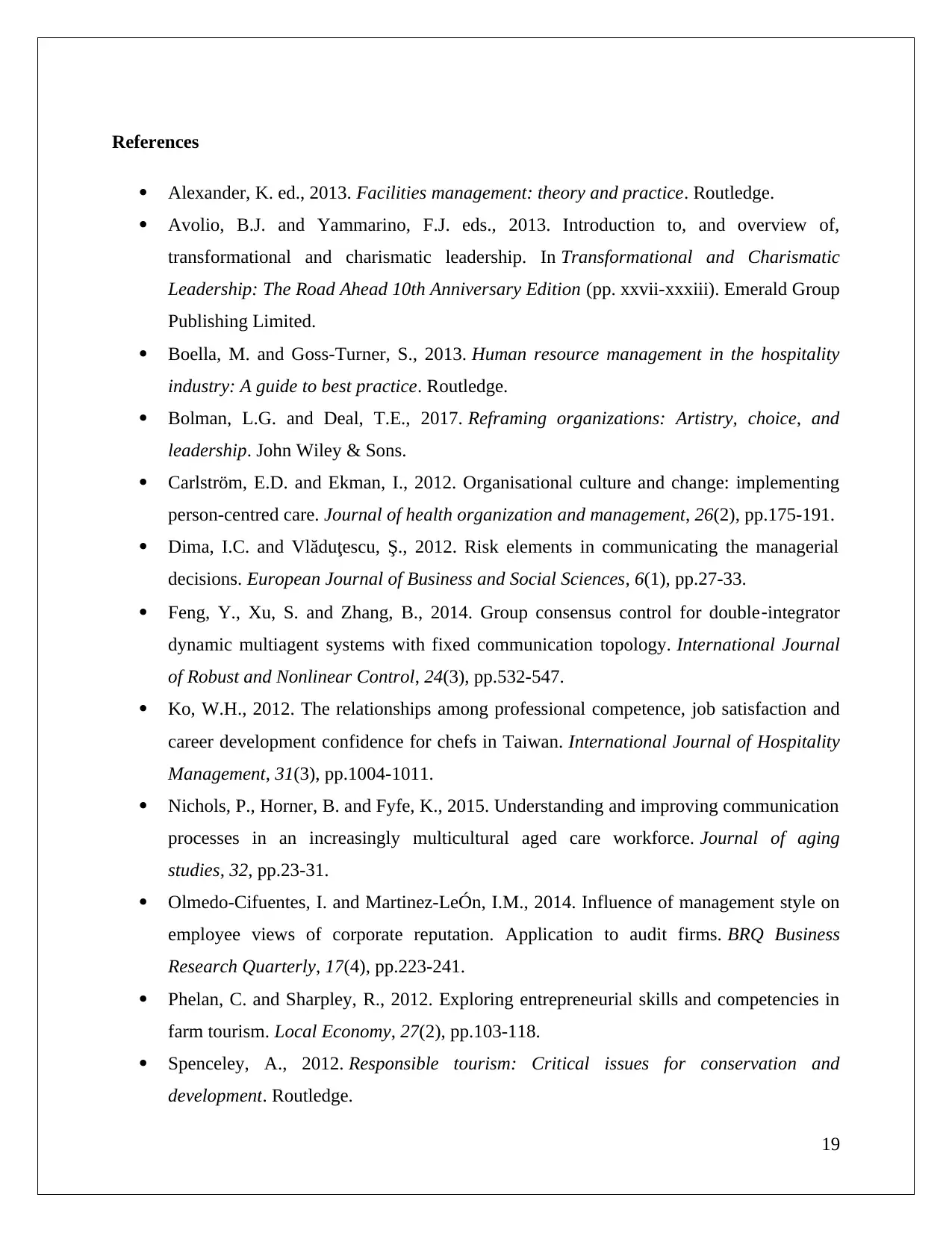
References
Alexander, K. ed., 2013. Facilities management: theory and practice. Routledge.
Avolio, B.J. and Yammarino, F.J. eds., 2013. Introduction to, and overview of,
transformational and charismatic leadership. In Transformational and Charismatic
Leadership: The Road Ahead 10th Anniversary Edition (pp. xxvii-xxxiii). Emerald Group
Publishing Limited.
Boella, M. and Goss-Turner, S., 2013. Human resource management in the hospitality
industry: A guide to best practice. Routledge.
Bolman, L.G. and Deal, T.E., 2017. Reframing organizations: Artistry, choice, and
leadership. John Wiley & Sons.
Carlström, E.D. and Ekman, I., 2012. Organisational culture and change: implementing
person-centred care. Journal of health organization and management, 26(2), pp.175-191.
Dima, I.C. and Vlăduţescu, Ş., 2012. Risk elements in communicating the managerial
decisions. European Journal of Business and Social Sciences, 6(1), pp.27-33.
Feng, Y., Xu, S. and Zhang, B., 2014. Group consensus control for double‐integrator
dynamic multiagent systems with fixed communication topology. International Journal
of Robust and Nonlinear Control, 24(3), pp.532-547.
Ko, W.H., 2012. The relationships among professional competence, job satisfaction and
career development confidence for chefs in Taiwan. International Journal of Hospitality
Management, 31(3), pp.1004-1011.
Nichols, P., Horner, B. and Fyfe, K., 2015. Understanding and improving communication
processes in an increasingly multicultural aged care workforce. Journal of aging
studies, 32, pp.23-31.
Olmedo-Cifuentes, I. and Martinez-LeÓn, I.M., 2014. Influence of management style on
employee views of corporate reputation. Application to audit firms. BRQ Business
Research Quarterly, 17(4), pp.223-241.
Phelan, C. and Sharpley, R., 2012. Exploring entrepreneurial skills and competencies in
farm tourism. Local Economy, 27(2), pp.103-118.
Spenceley, A., 2012. Responsible tourism: Critical issues for conservation and
development. Routledge.
19
Alexander, K. ed., 2013. Facilities management: theory and practice. Routledge.
Avolio, B.J. and Yammarino, F.J. eds., 2013. Introduction to, and overview of,
transformational and charismatic leadership. In Transformational and Charismatic
Leadership: The Road Ahead 10th Anniversary Edition (pp. xxvii-xxxiii). Emerald Group
Publishing Limited.
Boella, M. and Goss-Turner, S., 2013. Human resource management in the hospitality
industry: A guide to best practice. Routledge.
Bolman, L.G. and Deal, T.E., 2017. Reframing organizations: Artistry, choice, and
leadership. John Wiley & Sons.
Carlström, E.D. and Ekman, I., 2012. Organisational culture and change: implementing
person-centred care. Journal of health organization and management, 26(2), pp.175-191.
Dima, I.C. and Vlăduţescu, Ş., 2012. Risk elements in communicating the managerial
decisions. European Journal of Business and Social Sciences, 6(1), pp.27-33.
Feng, Y., Xu, S. and Zhang, B., 2014. Group consensus control for double‐integrator
dynamic multiagent systems with fixed communication topology. International Journal
of Robust and Nonlinear Control, 24(3), pp.532-547.
Ko, W.H., 2012. The relationships among professional competence, job satisfaction and
career development confidence for chefs in Taiwan. International Journal of Hospitality
Management, 31(3), pp.1004-1011.
Nichols, P., Horner, B. and Fyfe, K., 2015. Understanding and improving communication
processes in an increasingly multicultural aged care workforce. Journal of aging
studies, 32, pp.23-31.
Olmedo-Cifuentes, I. and Martinez-LeÓn, I.M., 2014. Influence of management style on
employee views of corporate reputation. Application to audit firms. BRQ Business
Research Quarterly, 17(4), pp.223-241.
Phelan, C. and Sharpley, R., 2012. Exploring entrepreneurial skills and competencies in
farm tourism. Local Economy, 27(2), pp.103-118.
Spenceley, A., 2012. Responsible tourism: Critical issues for conservation and
development. Routledge.
19
Paraphrase This Document
Need a fresh take? Get an instant paraphrase of this document with our AI Paraphraser
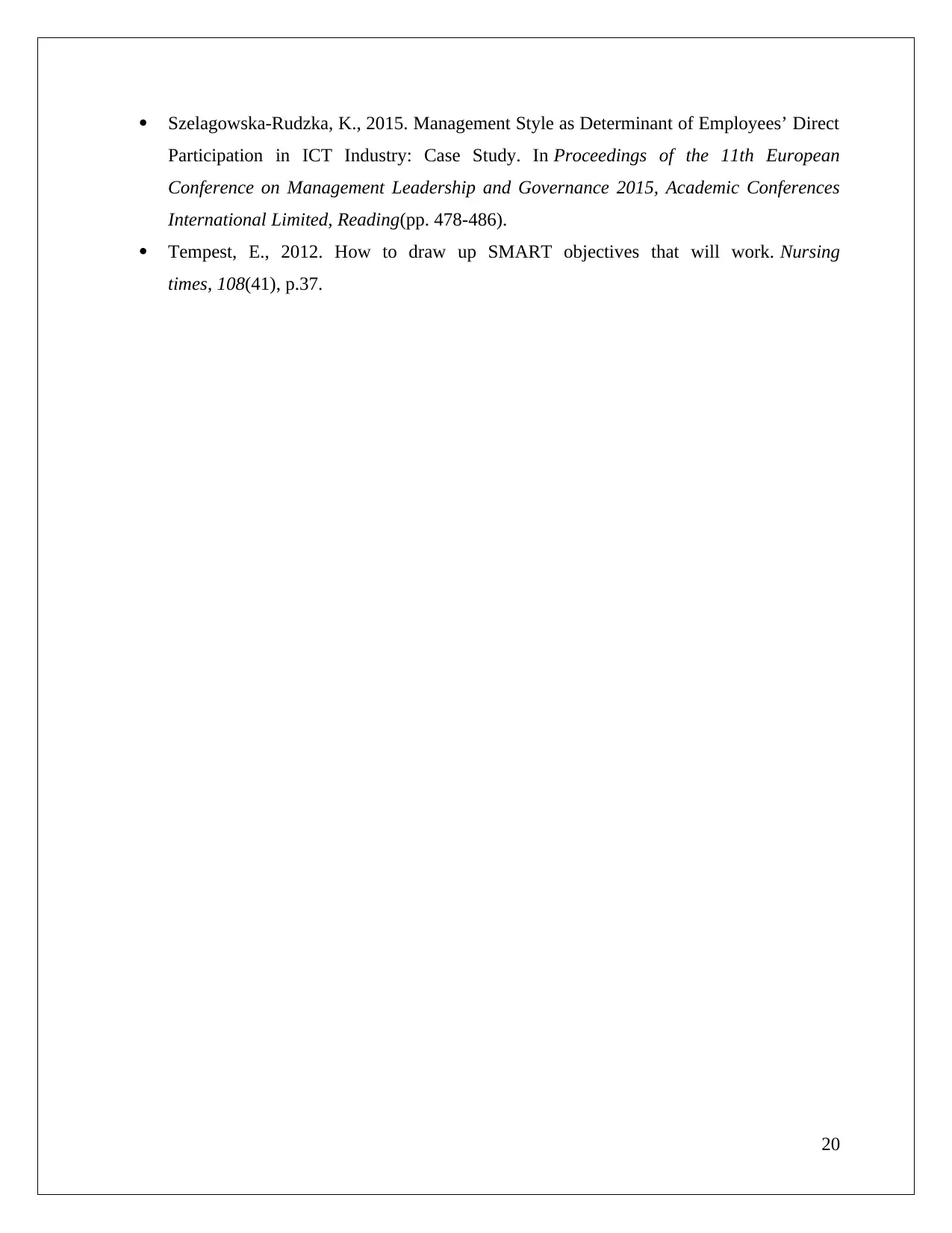
Szelagowska-Rudzka, K., 2015. Management Style as Determinant of Employees’ Direct
Participation in ICT Industry: Case Study. In Proceedings of the 11th European
Conference on Management Leadership and Governance 2015, Academic Conferences
International Limited, Reading(pp. 478-486).
Tempest, E., 2012. How to draw up SMART objectives that will work. Nursing
times, 108(41), p.37.
20
Participation in ICT Industry: Case Study. In Proceedings of the 11th European
Conference on Management Leadership and Governance 2015, Academic Conferences
International Limited, Reading(pp. 478-486).
Tempest, E., 2012. How to draw up SMART objectives that will work. Nursing
times, 108(41), p.37.
20
1 out of 20
Related Documents
Your All-in-One AI-Powered Toolkit for Academic Success.
+13062052269
info@desklib.com
Available 24*7 on WhatsApp / Email
![[object Object]](/_next/static/media/star-bottom.7253800d.svg)
Unlock your academic potential
© 2024 | Zucol Services PVT LTD | All rights reserved.





